








































OCTOBER 18, 2024
VOLUME 34 • NUMBER 1 1123 S. CHURCH ST. CHARLOTTE, N.C. 28203-4003 catholicnews@rcdoc.org
704-370-3333
The Most Reverend Michael T. Martin, OFM Conv., Bishop of Charlotte
INDEX
Contact us 2
Our Diocese 4-12, 14-21
Our Faith 3
Our Schools 13
Scripture 3
U.S. news 22-23
Viewpoints 26-27 World news 24-25
ne reason why the kitchen is referred to as “the heart of the home” is because so many memorable moments center around preparing and sharing food. Food also offers an opportunity to connect with our faith on an informal level, as we share recipes inspired by Church holidays. The Feast of St. John Paul II and the observance of Hallowtide – the Catholic season encompassing the three celebrations of All Hallows Eve or Halloween (Oct. 31), All Saints Day (Nov. 1) and All Souls’ Day (Nov. 2) – offer the ideal chance to cook up something sweet:

EDITOR: Trish Stukbauer 704-370-3335, tmstukbauer@rcdoc.org
ADVERTISING MANAGER: Kevin Eagan 704-370-3332, keeagan@rcdoc.org
HISPANIC MEDIA MANAGER: César Hurtado 704-370-3375, rchurtado@rcdoc.org
MULTIMEDIA DESIGNER: David Puckett 704-808-4521, dwpuckett@rcdoc.org
EDITORIAL TEAM: Kimberly Bender 704-370-3394, kdbender@rcdoc.org Troy C. Hull 704-370-3288, tchull@rcdoc.org Christina Lee Knauss 704-370-0783, clknauss@rcdoc.org
COMMUNICATIONS ASSISTANT/CIRCULATION: Amelia Kudela 704-370-3333, catholicnews@rcdoc.org
COMMUNICATIONS DIRECTOR: Liz Chandler 704-370-3336, lchandler@rcdoc.org
ASSISTANT COMMUNICATIONS DIRECTOR: Patricia L. Guilfoyle 704-370-3334, plguilfoyle@rcdoc.org
THE CATHOLIC NEWS HERALD is published by the Roman Catholic Diocese of Charlotte 26 times a year.
NEWS: The Catholic News Herald welcomes your news and photos. Please e-mail information, attaching photos in JPG format with a recommended resolution of 150 dpi or higher, to catholicnews@rcdoc.org All submitted items become the property of the Catholic News Herald and are subject to reuse, in whole or in part, in print, electronic formats and archives.
ADVERTISING: Reach 165,000 Catholics across western North Carolina! For advertising rates and information, contact Advertising Manager Kevin Eagan at 704-370-3332 or keeagan@rcdoc.org. The Catholic News Herald reserves the right to reject or cancel advertising for any reason, and does not recommend or guarantee any product, service or benefit claimed by our advertisers.
SUBSCRIPTIONS: $17.25 per year for registered families of the Diocese of Charlotte and $25 per year for all others
POSTMASTER: Periodicals Class postage (USPC 007-393) paid at Charlotte, N.C. Send address corrections to the Catholic News Herald, 1123 S. Church St., Charlotte, N.C. 28203.
Yes, even popes have a sweet tooth – and St. John Paul was no exception. According to Lois Britton’s Polish Housewife website, Kremówka Papieska, or Papal Cream Cake, is an ideal tribute to former Pope John Paul II as we celebrate his Feast Day on Oct. 22. She notes that kremówka – pastry cream sandwiched between two layers of puff pastry that is similar to a French Napoleon – became famous when the then-pope reminisced about enjoying the pastry from a bakery in his hometown of Wadowice, Poland.
Get the recipe on Britton’s website at www.polishhousewife.com.

The Catholic Church is blessed with a wide variety of saints – all those who have died and attained heaven – whom we collectively celebrate on All Saints’ Day, Nov. 1. Pan co’ Santi is seasonal sweet bread baked in Siena, Italy, and traditionally served on that day. This bread features walnuts and raisins – the “saints” that create its unique taste. Each family has their own recipe perfected over the years. The recipe found on Juls Kitchen is a modified family treasure that features red wine, extra virgin olive oil and sugar.
Read about the family history behind this version and make it at en.julskitchen.com/bread/pan-co-santi
QUEEN’S SIX TO PERFORM : 8 p.m. Monday, Oct. 28, in the Abbey Basilica on the campus of Belmont Abbey College. Presented by Arts at the Abbey, the Queen’s Six vocal ensemble, part of the Lay Clerks of St. George’s Chapel, will perform British music of the Renaissance, plus contemporary sacred and secular music. For details, call Karen Hite Jacob at 704-461-6012 or go to www.bac.edu.
PRAYER SERVICES
HOLY HOUR FOR NICARAGUA : All are welcome to a Holy Hour in Spanish for the Intention of Bringing Peace to Nicaragua. 7-8 p.m. every Thursday (except for the first Thursday of every month), St. Patrick Cathedral, 1621 Dilworth Road East, Charlotte.
SUPPORT GROUPS
NEW CATHOLIC GRANDPARENTS GROUP : A prayer and support group for Catholic grandparents in the Charlotte area. Details at www.catholicgrandparentsassociation.org.

Soul cakes are an English treat made to commemorate the dead during Hallowtide. Starting in medieval times up through the late 1800s, soul cakes were baked and given to soulers –typically children and the poor – who would go from door to door. If they were given a soul cake, they would sing and pray for the soul of the cake giver as well as for those of their deceased relatives and friends. Baking these sweet cakes that are a combination of a biscuit and a scone is the perfect time to share memories of, and pray for, loved ones.
Get the recipe at www.littlesugar snaps.com/soul-cakes.

OCT. 19 – 6:30 P.M. Mira Via Banquet
Charlotte Convention Center, Charlotte
OCT. 20 – 2:30 P.M.
Catholic Heritage Society Mass St. Patrick Cathedral, Charlotte
OCT. 22 – 7 P.M.
Confirmation & Pastor Installation
St. Francis of Assisi Church, Jefferson
OCT. 23 – 7 P.M.
Confirmation
St. John Baptist de La Salle Church, North Wilkesboro
OCT. 24 – 10 A.M.
Curial Cabinet Meeting Pastoral Center, Charlotte
Bishop Michael Martin, OFM Conv., will participate in the following events:
OCT. 26 – 5 P.M.
Hickory
‘The
When early 20th-century English writer G.K. Chesterton was asked why he became Catholic, his answer was characteristically pithy: “To get rid of my sins.” While in an essay entitled, “Why I Am a Catholic,” he would articulate many reasons to become Catholic (which he said all amount to one reason: that Catholicism is true), the forgiveness of his sins was perhaps his most personal motivation for conversion.
The good news of Jesus Christ cannot be rightly understood apart from the concept of forgiveness. Through His passion and resurrection, Christ saves us from our sins and from the wages of sin, which is death (cf. Rom 6:23). One of the chief challenges for evangelists today is proclaiming this good news to a population who no longer believes in sin, at least of the personal sort. We have no problem accepting the idea of societal sins, such as racism, environmental exploitation, wars of aggression and unjust distribution of resources, but when it comes to personal morality, the general feeling is “I’m OK, you’re OK.” To each his own! Whatever floats your boat! The one personal sin we do recognize is the sin of judgmentalism, which curiously is found only in others.
Before we can talk about forgiveness in Christ, we need to establish what is being forgiven. Sin is defined in the Catechism as “an offense against reason, truth, and right conscience” and “a failure in genuine love for God and neighbor caused by a perverse attachment to certain goods” (CCC 1849). There are multiple Hebrew words for sin used in Scripture, which may be translated into English as “iniquity,” “trespass” or “to fail.” The Hebrew word “hata” literally means “to miss the mark.”
This provides us with a good visual. Imagine you are an archer shooting at a target. You aim for the center, so anything other than a bullseye is missing the mark. But you can miss by varying degrees. Your arrow may land just a little off-center, missing the mark but still on target. If, on the other hand, you aim your arrow in the complete opposite direction of the target, not only will you miss, but you’re likely to cause serious harm by hitting something (or someone) you shouldn’t! Sin is like this, only the target we are aiming at is love. The bullseye is to “be perfect as your heavenly Father is perfect” (Mt 5:48).
All sin is a failure to love as we ought. When Adam and Eve trusted the serpent’s conniving words more than they trusted their Creator, that was a failure to

by Deacon Matthew Newsome
EDITOR’S NOTE
This article is the 10th of 12 in a series on the Creed. Look for new articles each month in the Catholic News Herald and online at www.catholicnewsherald.com.
love the God who made them. When Adam subsequently blamed Eve for his transgression, that was a failure to love his wife. When a man commits adultery that is a clear failure to love, but when he ignores his wife because of a “perverse attachment” to the football game he’s watching, that’s also a failure to love, but to a lesser degree. None of us consistently hits the bullseye of perfect divine love, and so “all have sinned and fall short of the glory of God” (Rom 3:23). This means we all need forgiveness. But what does forgiveness gain for us? As sin is an offense against love, its negative effects damage our relationships. Serious sin can rupture relationships entirely. Forgiveness is necessary to restore those relationships.
Many erroneously equate forgiveness with the idea of “getting over” emotional harms. It can be hard to reconcile this with Jesus’ command to forgive, and with our need for forgiveness from God. When Jesus speaks about forgiveness in the gospels, he often uses the image of monetary debt. This makes the nature of forgiveness easier for us to understand. If I loan you $100 and you fail to pay it back, you have made me $100 poorer. That unresolved debt now hangs over our relationship like a dark shadow. By forgiving your debt, I accept the loss of $100
and release you from any expectation to pay it back. The act of forgiveness restores the borrower to good standing in the eyes of his debtor. Forgiving non-monetary offenses such as betrayal of trust or other kinds of personal harm works in the same way, even if you can’t put a dollar sign on it. To forgive means accepting the harm and letting go of any claim on repayment for the damage.
So why do we need forgiveness from God? Any time we act unjustly or unlovingly toward our neighbor it is also an offense against God, because we are made in God’s image and God commands us to love one another. Our sin does not harm God in the literal sense – God is perfect. But it does harm our relationship with God by turning our hearts away from His goodness (see CCC 1850). Only God can forgive the debt we owe for disobeying His divine will. This is why when Jesus tells the paralytic man that his sins are forgiven, the scribes accuse Him of blasphemy (Mt 9:3).
The scribes were correct that only God can forgive sins. They were incorrect in their understanding of who Jesus was (and is). Jesus healed the paralytic to show them that “the Son of Man has authority on earth to forgive sins” (Mt 9:6). Jesus bestowed that same authority on the Apostles on the day of the resurrection, telling them, “Receive the Holy Spirit. Whose sins you forgive are forgiven them, and whose sins you retain are retained” (Jn 20:22-23).
The successors of the Apostles today continue to carry out this mission of mercy and forgiveness. We receive God’s forgiveness initially through baptism, which cleanses us of original sin, and subsequently through the sacrament of penance (confession) which reconciles us to the Father any time we repent of sins we have committed after baptism. Repentance means turning away from our sins and turning back to God and His goodness, which is what the Christian faith is all about – “repent and believe in the gospel” (Mk 1:14).
Heaven is eternal union with God, which makes the forgiveness of sins essential to our salvation. As St. Augustine rightly preached, “Were there no forgiveness of sins in the Church, there would be no hope of life to come or eternal liberation. Let us thank God who has given His Church such a gift” (Sermon 213, as quoted in CCC 983).
DEACON MATTHEW NEWSOME is the Catholic campus minister at Western Carolina University and the author of “The Devout Life: A Modern Guide to Practical Holiness with St. Francis de Sales,” available from Sophia Institute Press.

OCT. 20-26
Sunday (29th Sunday in Ordinary Time):
Is 53:10-11, Ps 33:4-5, 18-19, 20, 22, Heb 4:1416, Mk 10:35-45 or 10:42-45; Monday: Eph 2:1-10, Ps 100:1b-2, 3, 4ab, 4c-5, Lk 12:13-21; Tuesday: Eph 2:12-22, Ps 85:9ab-10, 11-12, 13-14, Lk 12:35-38; Wednesday: Eph 3:2-12, Is 12:2-3, 4bcd, 5-6, Lk 12:39-48; Thursday: Eph 3:14-21, Ps 33:1-2, 4-5, 11-12, 18-19, Lk 12:49-53; Friday: Eph 4:1-6, Ps 24:1-2, 3-4ab, 5-6, Lk 12:54-59; Saturday: Eph 4:7-16, Ps 122:1-2, 3-4ab, 4cd-5, Lk 13:1-9
OCT. 27-NOV. 2
Sunday (30th Sunday in Ordinary Time): Jer 31:7-9, Ps 126:1-2, 2-3, 4-5, 6, Heb 5:1-6, Mk 10:46-52; Monday (Sts. Simon and Jude, Apostles): Eph 2:19-22, Ps 19:2-3, 4-5, Lk 6:1216; Tuesday: Eph 5:21-33, Ps 128:1-2, 3, 4-5, Lk 13:18-21; Wednesday: Eph 6:1-9, Ps 145:10-11, 12-13ab, 13cd-14, Lk 13:22-30; Thursday: Eph 6:10-20, Ps 144:1B, 2, 9-10, Lk 13:31-35; Friday (Solemnity of All Saints): Rv 7:2-4, 9-14, Ps 24:1bc-2, 3-4ab, 5-6, 1 Jn 3:1-3, Mt 5:1-12a; Saturday (All Souls’ Day): Wis 3:1-9, Ps 23:13a, 3b-4, 5, 6, Rom 6:3-9, Jn 6:37-40
NOV. 3-9
Sunday (31st Sunday in Ordinary Time): Dt 6:2-6, Ps 18:2-3, 3-4, 47, 51, Heb 7:23-28, Mk 12:28b-34; Monday (St. Charles Borromeo, Bishop): Phil 2:1-4, Ps 131:1bcde, 2, 3, Lk 14:1214; Tuesday: Phil 2:5-11, Ps 22:26b-27, 28-30ab, 30e, 31-32, Lk 14:15-24; Wednesday: Phil 2:1218, Ps 27:1, 4, 13-14, Lk 14:25-33; Thursday: Phil 3:3-8a, Ps 105:2-3, 4-5, 6-7, Lk 15:1-10; Friday: Phil 3:17-4:1, Ps 122:1-2, 3-4ab, 4cd-5, Lk 16:1-8; Saturday (Dedication of the Lateran Basilica in Rome): Ez 47:1-2, 8-9, 12, Ps 46:2-3, 5-6, 8-9, 1 Cor 3:9c-11, 16-17, Jn 2:13-22
PLet us hope for ‘reconciled differences’
ope Francis called on divided Christians to overcome their doctrinal differences and walk together in love, expressing hope especially for greater unity between the Orthodox and Catholic Churches.
Speaking during his general audience in St. Peter’s Square Oct. 16, the pope acknowledged historical differences among Christian communities, but he stressed that the path forward lies in reconciliation.
“Among Christians, there are so many differences,” he said, “but the important thing is that these differences are reconciled in the love of walking together.”
As part of his ongoing catechesis on the Holy Spirit, Pope Francis spoke about the historic split between the Catholic and Orthodox Churches, known as the Great Schism of 1054.
One issue that led to the division was the Catholic Church’s addition of the Latin term “filioque” – meaning “and from the Son” – to the Nicene Creed, which signaled that the Holy Spirit proceeds from both the Father and the Son. This theological disagreement, along with other cultural and political factors, contributed to the long-standing rift between the two branches of Christianity.
Yet Pope Francis expressed hope that the issue would become “one of the main reconciled differences” between the churches since the dialogue between them has meant their disagreement “has lost the harshness of the past and today allows hope for full mutual acceptance.”
Even while differences remain, he said, “we can value the most important prerogative for us that is proclaimed in the article of the creed, namely that the Holy Spirit is the ‘giver of life,’ that is, life-giving.”
At creation, he said, God breathed life into Adam, and “now, in the new creation, the Holy Spirit is the one who gives believers new life, the life of Christ, supernatural life, as children of God.”
“Where, in all of this, is the great and consoling news for us?” he asked. “It is that the life given to us by the Holy Spirit is eternal life.”
“Faith frees us from the horror of having to admit that everything ends here, that there is no redemption for the suffering and injustice that reign supreme on earth,” the pope said. “The Spirit lives in us, it is in us.”
After his main speech, Pope Francis asked visitors in the square not to forget countries experiencing war. “Brothers and sisters, let us not forget that war always, always, is a defeat,” he said.
CHARLOTTE — Bishop Michael Martin has appointed Father Noah Carter as director of the diocese’s Divine Worship Office, effective Oct. 14. The office oversees the celebration of liturgies, liturgical norms, and the design and use of worship spaces.

Father Carter, pastor of Holy Cross Parish in Kernersville, succeeds Father Christopher Roux, who served for over 20 years as liturgy director and as master of ceremonies for the bishop, in addition to his assignment as rector of St. Patrick Cathedral in Charlotte. Father Carter holds a License in Liturgical Theology from the University of the Holy Cross in Rome.
Father Carter will work together with Father Juan Miguel Sanchez, the bishop’s priestsecretary and diocesan master of ceremonies. The two have collaborated on major liturgies such as Bishop Martin’s episcopal ordination, the ordinations of priests and deacons, and the Diocese of Charlotte Eucharistic Congress.
Bishop Martin has tasked Father Carter with evaluating future needs of the Divine Worship Office, which has seen an increased workload related to church design and ordination liturgies. Father Roux “will remain a resource for me and for the office moving forward,” Bishop Martin said, also expressing gratitude “for his faithful and dedicated service.”
— Catholic News Herald
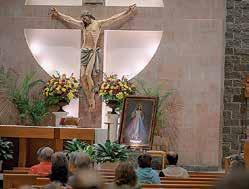
St. Matthew Parish celebrates the healing of
CHARLOTTE — Members of St. Matthew Parish gathered for their 14th annual Divine Mercy Day of Healing on Oct. 5, the feast day of St. Faustina. The day included Mass and recitation of the Divine Mercy Chaplet, veneration of St. Faustina’s relic, and a talk by guest speaker Father Rodolph Wakim, who presented this year’s theme: “Embracing Divine Mercy: Unveiling the Seven Secrets of Divine Mercy.” This enriching seminar was designed to deepen understanding of God’s infinite mercy and foster a communal atmosphere for prayer, reflection and spiritual renewal.
— Lennie Cox and Binh-An Nguyen
CHRISTINA LEE KNAUSS
clknauss@rcdoc.org
CHARLOTTE — Bells, chants and the aroma of incense filled the air Sunday as two bishops from two different Catholic traditions met for the first time.
Bishop Michael Martin visited St. Basil the Great Eastern Catholic Parish in Charlotte Oct. 13 and met its shepherd, Bishop Bohdan Danylo of the Ohio-based Eparchy (Diocese) of St. Josaphat, for a Mass celebrated in the Eastern Catholic tradition.
Bishop Danylo was in Charlotte Oct. 12-13 for a pastoral visit. His eparchy encompasses parishes in 11 states including St. Basil in Charlotte. The Mass, or Divine Liturgy, commemorated the 10th anniversary of his episcopal ordination and the 40th anniversary of the eparchy.
St. Basil the Great Parish has grown into a multi-ethnic congregation brought together by the ancient spirituality and liturgy of Byzantine (Eastern) Christianity, said its pastor, Father Joseph Matlak. The community, which worships at St. Thomas Aquinas Church in Charlotte, has received support and encouragement from the Diocese of Charlotte since its founding in 2006.
At the beginning of Sunday’s celebration, members of the parish presented both bishops with bread and salt – traditional symbols of hospitality and friendship.
Members of the parish and many visitors filled Aquinas Hall at St. Thomas Aquinas Church for Sunday’s celebration, joining in harmony to sing the many prayers that make up the Divine Liturgy.
Bishop Danylo celebrated the liturgy, with priests from the Diocese of Charlotte and Belmont Abbey joining him and Bishop Martin attending in choir.
In his homily, Bishop Danylo referred to the day’s Gospel reading, which recounted Christ’s parable of the sower from Matthew’s Gospel. The parable compares seeds that fall on different types of soil to the way different types of people react to God’s Word.
“This message challenges us on this beautiful October day – how will we carry the Word of God given to us in the Gospel?” the bishop asked. “I admire your community because you come together not only to celebrate Divine Liturgy but to pray the Vespers together on Saturdays. Prayer is what gives us the strength to grow that seed – the beauty of our Byzantine tradition that we hold so dear to our hearts.”
Bishop Danylo recalled how the Byzantine community once was small but now takes up nearly all of the space in Aquinas Hall, and he challenged members of St. Basil to continue their growth by reaching out to more people in the community.
“So many people are hungry to know the Word of God and know that someone loves them,” he said. “Let people see in your face the kindness and gentleness of the One who came to us. May this community be the image of the seed that
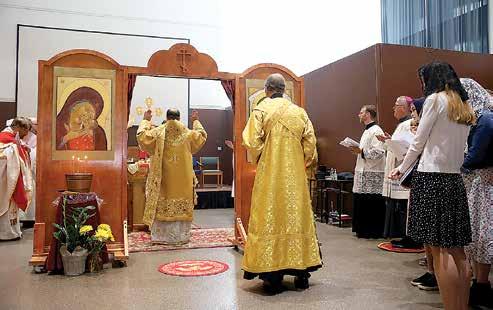
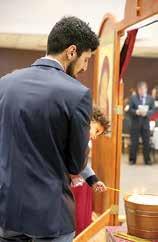
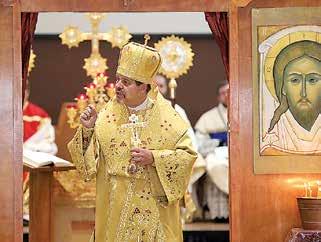
grows and bears fruit.”
At the end of the celebration, Bishop Danylo thanked Bishop Martin for the diocese’s support of the community over the past two decades and expressed the hope that one day St. Basil’s growing congregation will worship in their own church.
Bishop Martin was presented with an icon dedicated to the Feast of the Protection of the Mother of God, which falls on Oct. 1.
He thanked Bishop Danylo, Father Matlak and the parish for the gift and the warm welcome. “It’s good to be able to celebrate together and to know of our communion,” he said. “Know that your parish community … is always welcome here.”
In honor of the anniversary celebration, people also were able to venerate two first-class relics (a physical piece of a saint) that were on display: St. Basil the Great, patron saint of the parish, and St. Josaphat, the eparchy’s patron. A piece of the True Cross was also on display.
Members of the congregation gathered for a meal at the end of the liturgy, which featured everything from barbecue and macaroni and cheese to traditional Eastern European foods like kielbasa and stuffed cabbage rolls.
“It was wonderful to see both bishops here and to see so many people turn out for the liturgy,” said Anesa Loya, a member of St. Basil Parish. “It’s always nice when East meets West!”
Father Michael Debesay of the Charlotte Eritrean Catholic Community was grateful to be able to attend the special liturgy with both bishops.
“This is the beauty of the Catholic Church,” he said. “We have different forms of worship but the same heartbeat. It was such a wonderful experience to be standing together with the other priests and to see the bishops. This is what Jesus meant when He gave us the Church.”
More online
At www.catholicnewsherald.com : See more photos from the Divine Liturgy with Bishop Bohdan Danylo
CHARLOTTE — Catholic households across the Diocese of Charlotte are being asked to consider a donation to help fund the education of our future priests by giving to the seminarian education second collection taken up in all parishes Nov. 2-3.
“Impressive growth has taken place within our diocese over recent years, creating a need for priests to serve the growing numbers of Catholics in our diocese,” Bishop Michael Martin said in a recent letter to parishioners urging them to support the collection.
The number of seminarians has nearly tripled in the past four years – from 16 seminarians to 46.
“This is both a blessing and a challenge with the need to educate, nurture and form our future priests,” the bishop noted.
The need for more priests to serve the growing Catholic population has never been greater. The diocese saw a 26% increase in growth, from 58,500 registered households in 2010 to 73,700 in 2020. By 2025, it is estimated that the number of registered households will climb to 86,800.
The people of Immaculate Conception Parish in Forest City took part in a public witness of faith Oct. 12 during the parish’s 12th annual “Cross a Thon.”
Participants carried crosses of various sizes as they walked down Main Street in celebration of their religious liberties, as acts of penance, and as
“By contributing to the formation of our future priests, you are helping to ensure that the sacraments, spiritual guidance, and the light of Christ continue to reach every corner of our growing diocese,” the bishop said.
In addition to considering a gift to support all diocesan seminarians, Bishop Martin asks the faithful to pray for each of the men by name. The names of the seminarians are listed in the brochure sent to all households with the letter. — Catholic News Herald
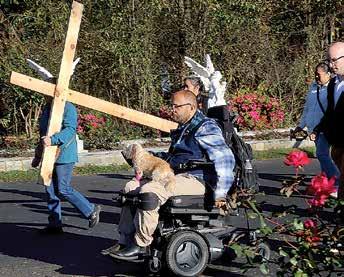
To make a gift to support seminarian education, please drop off or mail your contribution to your parish, return the form sent to your home, or make a secure gift online. If making an online gift, consult your parish’s website to see if they offer online giving or go online to www. charlottediocese.org/donate, then click on “Seminarian Education Campaign.”
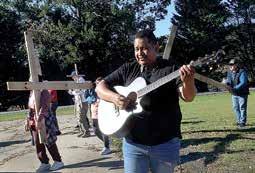
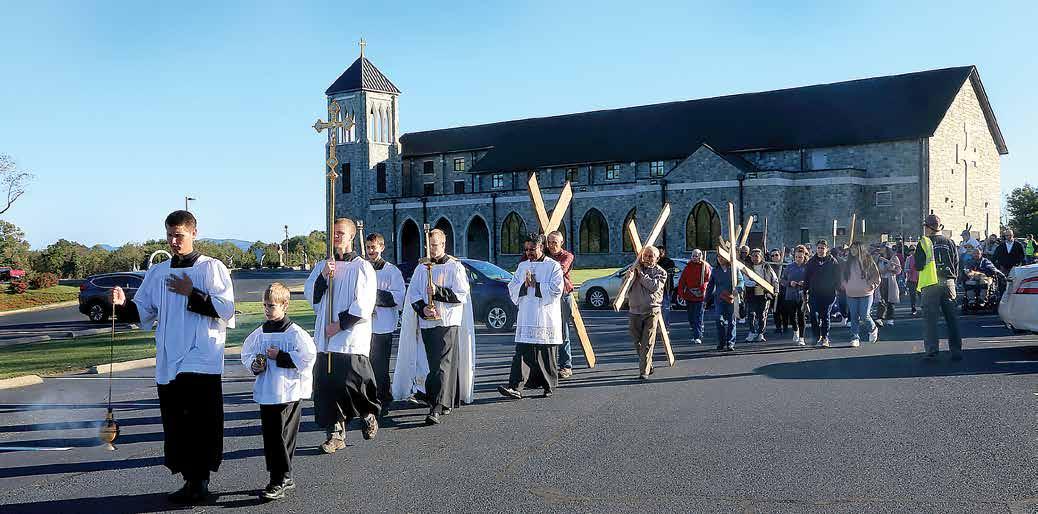

CHRISTINA LEE KNAUSS clknauss@rcdoc.org
CHARLOTTE — Couples celebrating milestone wedding anniversaries are invited to attend the annual Wedding Anniversary Mass at 3 p.m. Sunday, Oct. 27, at St. Patrick Cathedral.
Bishop Michael Martin will be the celebrant.
The annual event, sponsored by the Diocese of Charlotte’s Family Life Office, is open to all married couples but particularly those celebrating 25 or 50 years of marriage.
A reception with the bishop will be held
after Mass.
Couples celebrating these milestone anniversaries can receive a special certificate commemorating their anniversary by signing up at www. charlottediocese.org/form-anniversarymass-for-couples.
St. Patrick Cathedral is located at 1621
Dilworth Road East in Charlotte. Street parking is available for attendees of the anniversary Mass. There will be no parking in the cathedral’s rear parking lot. Limited handicap parking will be available on Buchanan Street and behind the rectory, as well as some spaces in the lower lot.
St.
Father Jacob Mlakar becomes pastor of St. Francis of Assisi Parish and St. Frances of Rome Mission.
ANNIE FERGUSON arferguson@rcdoc.org
JEFFERSON — Father Jacob Mlakar was up late at Casa Santa Maria, a home for American priests studying in Rome, when he received the call that surprised him. Monsignor Patrick Winslow, vicar general and chancellor of the Diocese of Charlotte, told him he’d been appointed to pastor St. Francis of Assisi Parish in Jefferson and St. Frances of Rome Mission in Sparta.

“I was surprised and excited to be made pastor. … It was a wonderful surprise,” said Father Mlakar, who had expected to remain an assistant pastor for a year or two more. “It gave me something to look forward to and made me all the more motivated to finish my studies.”
While it might seem daunting for a first-time pastor to take on two churches instead of one, Father Mlakar’s few months have proven a breath of fresh air for him.
“There’s a learning curve, but I am happy to serve
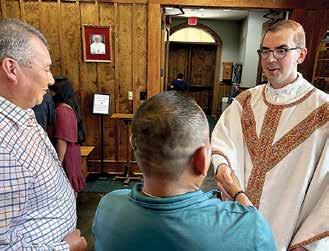
the populations of the parish and the mission,” said the Ohio native, who earned his theology degree from the Pontifical University of St. Thomas.
“Being in Rome studying for a year, I didn’t hear many confessions. I didn’t do any anointings. Being back here, I was able to get back into those things because of my previous parish experience.”
After his ordination in 2020, Father Mlakar served as parochial vicar at St. Vincent de Paul Parish in Charlotte for a year and for two years at Holy Cross Parish in Kernersville before moving to Rome – an experience he says equipped him in both spiritual and practical ways for his ministry.
He recently shared observations from his few months as a pastor.
CNH: What does it mean to you to become a pastor?
Father Mlakar: It means a great deal. This is what I’ve wanted to be, especially to be pastor in the mountains.
… There’s a lot of new things I’m learning, but I am definitely enjoying being back in parish ministry after earning my licentiate and being able to take more of a leadership role in the parish.
CNH: How did your studies this past year prepare you for your pastor role?
Father Mlakar: The licentiate and spiritual theology is all about the spiritual life, especially studying the writings of the saints. It was (taught) in the Dominican tradition, but we studied all the great spiritual writers.
That’s been extremely helpful in my preaching and the way I relate to people and the advice I give on the spiritual life. It’s a very good theological degree but also it is very practical for a parish priest to be able to get up and draw from the great wisdom of our spiritual tradition.
CNH: How have your first months as pastor been going?
Father Mlakar: They’ve definitely been busy, starting with moving into a new house and trying to keep a tidy house
MLAKAR, SEE PAGE 28
Saturday Nov. 2
St. Dorothy Parish, Lincolnton
ANNIE FERGUSON arferguson@rcdoc.org
LINCOLNTON — It didn’t take long for Father Michael Carlson to follow the promptings of the Blessed Mother in his first assignment as pastor.
Soon after he arrived as pastor of St. Dorothy Parish in Lincolnton, he had the opportunity to bless and enroll 104 children wearing brown scapulars – a sacramental garment worn by those devoted to Mary, the Mother of God, and the spirituality of the Carmelite Order.

“It’s astonishing to have so many,”
Father Carlson says, noting the children were part of a record number attending the parish’s annual Catholic Kidz Camp.
“It’s a very young parish with a lot of young families. … The parishioners are very well formed – and that’s something I’d like to continue.”
Father Carlson’s own personal devotion to the brown scapular and consecration to Our Lady is what led him to enter seminary, he said.
Ordained in 2019 by Bishop Peter Jugis, Father Carlson – a California native – received his theology degree from the Pontifical North American College in Rome, where he also obtained a canon law degree in 2021. While serving
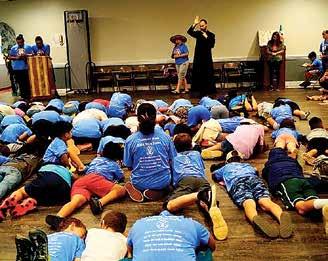
at St. Dorothy, he will also continue his roles as promoter of justice for the diocese’s tribunal and as chaplain of the local chapter of Courage International, a support and spiritual guidance group for people experiencing samesex attraction.
Father Carlson’s five years as a parochial vicar included assignments at Our Lady of Grace Parish in Greensboro and St. Mark Parish in Huntersville.
He reflects here on this important moment in his ministry.
CNH: What does it mean to you to become a pastor?
Father Carlson: It’s a step up in responsibility. I see being a pastor as an elevation of the priest’s role as a father. You really become the father of your community and, with that, responsibility (for) all of their spiritual needs in so many ways falls on your shoulders as far as the sacraments and preaching. During the first time I drove into Lincolnton after knowing that I’d be the pastor, it was amazing the change that came over me. I felt this real responsibility … a bit of this fatherly watchfulness over all the people in Lincolnton. Then I also felt a real weight of responsibility of needing to do something for each soul within this territory.
CNH: How have your first weeks been going?
Father Carlson: The first weekend was kind of a celebration and people are so excited, but both on the part of the priest and on the part of the people, you’re mourning. You’re mourning your former assignment and just all the people, the relationships, the time and energy and all the prayers said, and they’re mourning their former pastor. It’s also a time of celebration because you know we’ll be at peace together in the most important moments in terms of Mass and the sacraments.
We’ll be spending a lot of time together. I’ve really been thinking a lot about that family dynamic because, especially with a smaller parish, it really does function in many ways like a family. That can be a challenge but also a beautiful and powerful thing.
Bishop Michael Martin will formally install these first-time pastors during special Masses in the coming weeks
St. Francis of Assisi Parish, Lenoir
CHRISTINA LEE KNAUSS clknauss@rcdoc.org
LENOIR — Father Alfonso Gamez stepped into his new role as pastor at St. Francis of Assisi Parish in July and says he’s already learning new ways to relate to people and rely on God to expand his ministry.

Ordained in 2019, Father Gamez was celebrating the fifth anniversary of his priesthood when he learned he’d soon become a pastor. His formal installation Mass will be held at 10 a.m. on Nov. 3.
His first assignment as a priest for the Diocese of Charlotte was serving as parochial vicar at St. Mark Parish in Huntersville in 2019 – an experience he values for having given him the chance both to serve a large parish and to learn how to adapt to a crisis: COVID-19. He then worked as parochial vicar at Our Lady of Mercy Parish in Winston-Salem and St. Vincent de Paul Church in Charlotte.
Father Gamez talked about his experience as a new
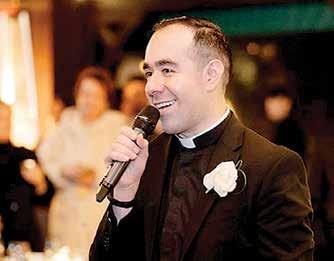
pastor recently, in reflections here:
CNH: What does it mean to you to become a pastor?
Father Gamez: My life as a pastor began on July 9, and this is something that I really wanted. I gained a lot of experience from my previous assignments and had
become used to the basics of the priesthood, and I had a deeper desire to have a little more creativity in decisionmaking and working with parishioners. This is just a next step in my growth as a priest.
CNH: How have your first few weeks as a pastor been going?
Father Gamez: There have been challenges because shortly after I became pastor, in the same week I got the flu, and then a big tree in front of the rectory got struck by lightning and had to be cut down. I was telling a friend that I could feel the experience of growth because I was having so many experiences not familiar to me in terms of administration and decision-making. I feel God is allowing me to grow through the work I’ve been doing. Also, the parishioners here are great – super hospitable and super kind. I was assigned here in the summer of 2015 while I was a seminarian, so I knew some of the parishioners here already. That has made the transition a smoother landing. I also am grateful I got to talk to Bishop Martin about my new role. I talked to him personally about the challenges I face, and there is a great peace that I received with him telling me to move forward with things. I feel like I’m doing God’s will with his encouragement. I feel so much peace, because I know that this is not my work – it’s all for the glory of God.
CNH: What have you learned so far?
Father Gamez: I’ve learned to listen and be honest and tell people all the things I don’t know and depend on their
CHRISTINA LEE KNAUSS clknauss@rcdoc.org
BRYSON CITY — Becoming a pastor has definitely been a learning experience for Father Victor Ameh.
Not only was the Nigerian-born priest taking on the role of pastor for the first time – he also was assigned to a parish and a region he was completely unfamiliar with. Previously, Father Ameh worked in parishes in Nigeria and New York as both a priest and missionary. He arrived in the Diocese of Charlotte in 2024 and served as parish administrator at Our Lady of the Assumption Parish in Charlotte since February. Now, he’s left the diocese’s biggest city and settled in the North Carolina mountains, where he’ll pastor St. Joseph Parish in Bryson City and its Our Lady of Guadalupe Mission in Cherokee.

He recently reflected on his new assignment:
CNH: What does it mean to you to become a pastor?
Father Ameh: When the letter came from the bishop that I was assigned as pastor to St. Joseph’s in Bryson City and a mission church at Cherokee, I was excited on the one hand, having been made a pastor, but on the other hand, I had no idea where Bryson City or Cherokee were – and what kind of people I was going
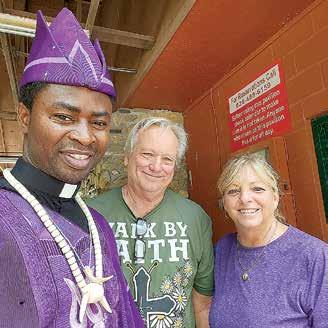
to serve. A friend of mine, after looking it up on the internet, told me it was in the mountains. I was somewhat convinced that God has an interesting story to tell with me. Friends, I am not kidding you, it was a three-hour drive from where I was living at the time in Charlotte.
CNH: How have your earlier assignments helped you in your new role?
Father Ameh: I have worked as an associate to pastors who embody the spirit of dedication, passion for ministry and inspiration. From my years in the seminary and from the pastors I had earlier worked with, I had learned the role of a pastor is that of being all things to all people, as St. Paul rightly put it (1 Cor. 19:19-23). As administrator at Our Lady of the Assumption, many of the decisions about shepherding lay on my shoulders. Amazingly, that provided me with much opportunity for personal and professional growth.
CNH: How have your first few weeks as pastor been going?
Father Ameh: My first Sunday in church was deeply significant, as those who came to church wondered how I managed to speak good and clear English. I knew firsthand that I had inherited a very welcoming community. I received a warm welcome from the congregation, with members eager to introduce themselves, share their stories and to hear mine afterwards. Becoming part of this community and forming new relationships with the different families in the parish has been a source of inspiration, joy and support. Also, listening to the parishioners has been crucial. Understanding their needs, concerns and desires helped me build trust with the community. I intentionally used my first few weeks to learn about the church’s history, traditions and mission as a small unit within the collective body of the universal Church. Understanding the community’s needs and dynamics has been key in my ministry to them thus far.
CNH: What have you learned so far?
Father Ameh: I have learned the People of God are good
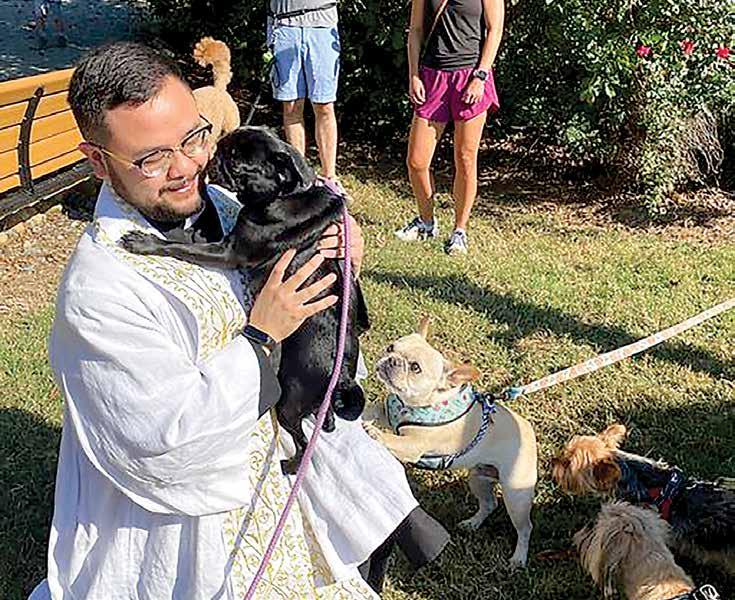

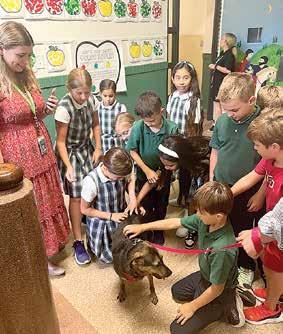
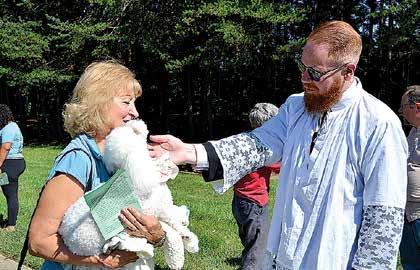

Pet parents of the furry, hooved, feathery and scaly brought their beloved animals to receive a special blessing at parishes across the Diocese of Charlotte in early October.
The annual Blessing of the Animals honors the Oct. 4 feast of St. Francis of Assisi, patron saint of animals and ecology. Pet owners know the special role their animals play in their lives as a source of unconditional love and stress relief, and pet blessings are a chance to share the love of God with these special creatures.
At www.catholicnewsherald.com : See pictures from across the diocese.
Francis was born into a wealthy family in Assisi, Italy, in 1181. At 21, he went off to war in northern Italy. He returned a changed man and devoted his life to God, saying he was called to live a life of poverty and work to revitalize the Church.
Francis became an itinerant preacher whose words were heard by thousands. He eventually founded the Franciscan religious order. Throughout his life, he was known for having an affinity for animals, with stories told of birds and other creatures surrounding him as he traveled.
Francis is said to have started the custom of blessing animals between 1210 and 1215, and to have started the first outdoor Nativity scene featuring live animals in 1223.
Francis frequently preached on God’s love for all His creatures and the need to show respect and love to all. St. Francis of Assisi died, presumably from a bacterial infection, on Oct. 3, 1226, at 44. He was canonized on July 16, 1228, by Pope Gregory IX. — Catholic
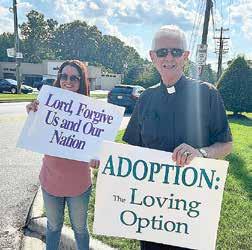
Faithful across the Diocese of Charlotte gathered on Sunday, Oct. 6, to kick off Respect Life Month and form Life Chains as a public witness to the dignity of all human life.
Amid ongoing response efforts to Tropical Storm Helene, many areas still held the annual event. “(Jesus) calls each of us to respect that gift of life in every human person,” said Bishop Michael T. Burbidge of Arlington, Virginia, chairman of the U.S. Conference of Catholic Bishops’ Committee on Pro-Life Activities.
“While we live in a society that often rejects those who are weak, fragile or vulnerable, they are the most in need of our care and protection. Through the graces of this revival, may we witness, work and vote so that all children in the womb will be protected in law and welcomed in love, and that all mothers and families will be strengthened by our support and accompaniment.” — Catholic News Herald More online
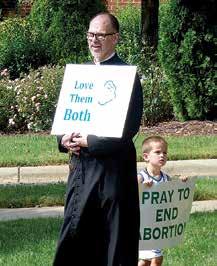
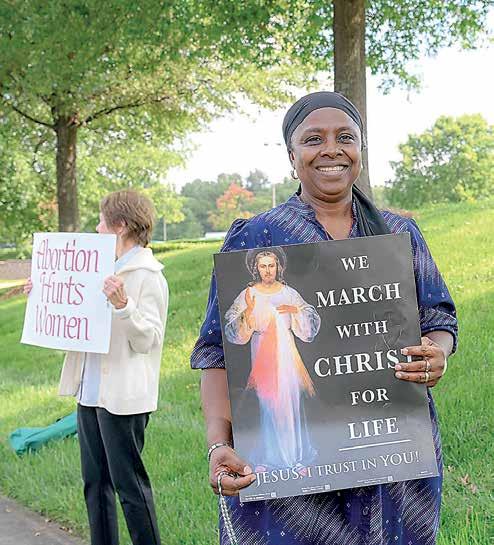
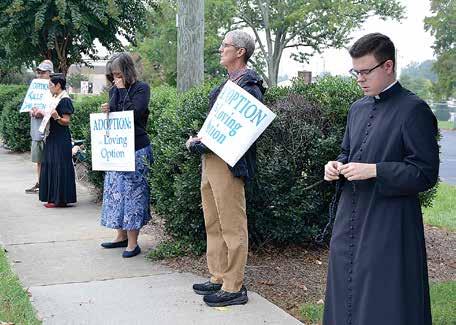
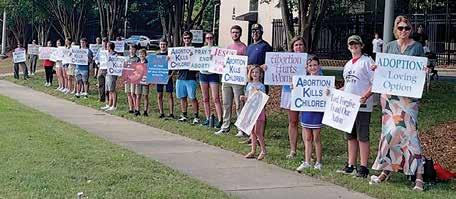

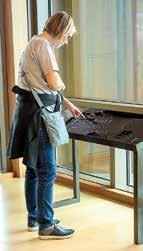
CHARLESTON, S.C. — On Oct. 5, 50 parishioners from across the Diocese of Charlotte embarked on a journey to Charleston, South Carolina, to visit the International African American Museum. This powerful experience was a joint venture between the diocese’s African American Affairs Ministry and the Social Justice Ministry of St. Peter Catholic Parish in Charlotte. The trip’s purpose aligned with the ministries’ shared mission of evangelization and community outreach, while also educating participants on the African American journey and how African Americans have shaped U.S. history and culture.
The group represented five parishes: Our Lady of Consolation, St. Peter and St. Matthew in Charlotte, Queen of the Apostles in Belmont, and St. James the Greater in Concord.
They participated in a self-guided tour of the International African American Museum, which explores African and African American history, culture and heritage.
For many, the museum’s Center for Family History was particularly meaningful. Participant Catherine Gomez said, “I felt an incredible connection to my ancestors as I learned about the tools available to trace African American family histories. It was both educational and emotional, a true reminder of where we come from.”
After leaving the museum, the group enjoyed a driving tour of historic Charleston, led by John Hodgson. Hodgson guided participants through the city’s lower downtown and the Battery, weaving together the historical context of the enslaved Africans’ labor with the beauty and wealth of the city they helped build.
“Seeing Charleston from this perspective after the museum was a profound experience,” said Jenny Cox of St. Peter. “It reinforced the importance of understanding how intertwined our history is with the sacrifices of African Americans.”
As the bus made its way back to Charlotte, participants reflected on the day’s events.
Pat McDonald of Our Lady of Consolation said, “This trip was not just educational, it was spiritual. It deepened my understanding of the strength and resilience of the African American community, and it reinforced how we, as a Church, are called to support justice and healing.”

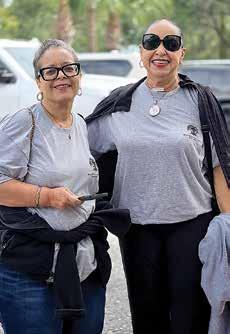

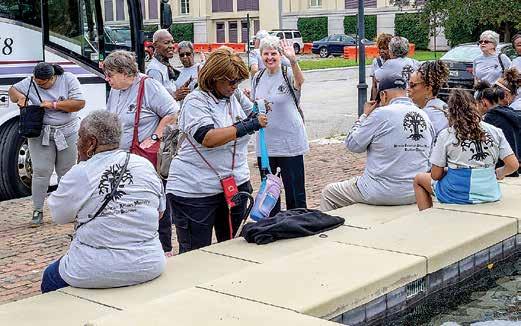
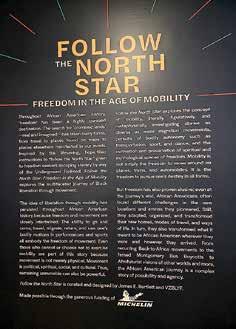
CHARLOTTE — Two Charlottearea Lay Dominican organizations recently held annual Rites of Reception and Promises.
St. Dominic founded the Order of Preachers, known as the Dominicans, in 1216. The Dominican Fraternity includes Dominican friars (first order), cloistered Dominican nuns (second order), and the third order: religious (ordained priests and religious sisters) and secular (laity). Dominican laity adopt a spiritual practice of daily Morning and Evening Prayer from the Liturgy of the Hours, daily rosary, study, contemplation and, where available, daily Mass and monthly confession.
A five-year formation process enables people to discern a call and adopt a daily routine that blends the Dominican charism with their family, parish, work and civic obligations.
St. Ann Church hosted a Sept. 21 Mass for Our Lady of Perpetual Help Chapter’s Rite of Reception and Promises ceremony. Martina Benedikovicova, Kristine Lentl and Deacon Martin Ricart III each made a one-year promise, becoming new candidates in the five-year formation process. Daniel Peters made a threeyear promise. Carolyn Franks, Renate Rayner, Mary Clark, Jean Winkelman and Diona Mathews made Perpetual (lifetime) promises.
Started in 2009, the chapter has more than 45 members who actively support the works of the Church in
their home parishes throughout the Carolinas. OLPH chapter meetings and formation classes are held monthly. Their next inquirer meeting will be held at 8:30 a.m. Saturday, Oct. 19, at St. Joseph College Seminary, 22 Arctus Ave., Mount Holly. Contact Gretchen Filz, chapter president, at gmfilz@gmail.com.
Our Lady of the Rosary Group celebrated its Rite of Reception and Promises Sept. 28 at St. Matthew Church in Charlotte. Phil Haemmerlein and Joe Warwick made a one-year promise. Janet Norton made her three-year promise. Since 2021, OLOR has gained over 10 members, all active in their home parishes. They meet monthly at St. Matthew Church. Their next inquirer information meeting will be at noon Sunday, Oct. 20, at St. Matthew Church, 8015 Ballantyne Commons Pkwy., Charlotte. Contact Tom Mathis, group president, at tom. mathis.olor@gmail.com.
Also, in addition to Father Matthew Kauth, rector of St. Joseph College Seminary, and Father Joseph Matlak, pastor of St. Basil the Great Eastern Catholic Parish, two priests in the diocese recently completed Lay Dominican priestly formation in Siena, Italy: Father Matthew Buettner, spiritual director at St. Joseph College Seminary, and Father Jason Christian, pastor of St. John the Baptist Parish in Tryon.
— Sandra W. Coughlin
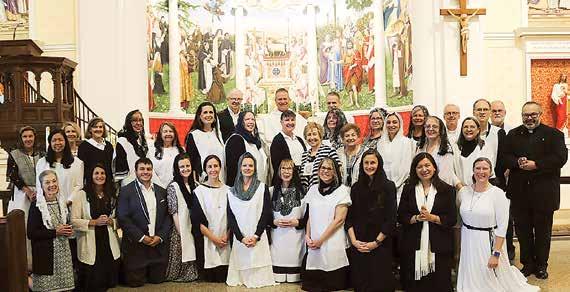
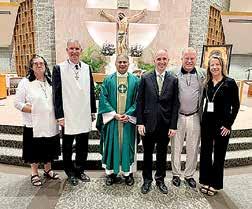
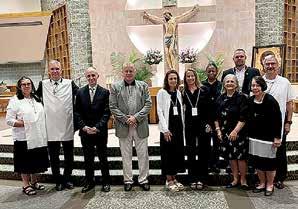


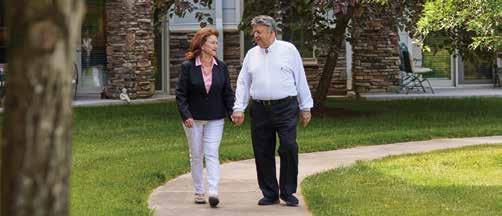
Abundant amenities and a unique way of life
e Pennybyrn lifestyle is packed with amenities. Living here, you’ll swim laps in a stunning, indoor heated saltwater pool, stay t in a well-equipped facility and power walk, bike or stroll along scenic walking trails. Even membership at Jamestown Park Golf Course is included!
ere’s also the Pennybyrn di erence… and this is what truly sets us apart. You’ll nd a lovely Peace Chapel, a not-for-pro t mission to serve all faiths,
a smaller population for personalized service and inclusiveness that means your voice will always be heard.
A thoughtfully designed home
Your private residence at Pennybyrn—chosen from among a variety of oor plans and prices— will feature a bright, open design with plenty of natural light, a well equipped, modern kitchen, washer and dryer, high ceilings and a private porch, balcony or patio.
Most cottages include an attached garage or carport, and many o er a cozy replace. Inspiring lifestyle choices
In a friendly neighborhood, and among sociable friends, you’ll explore a wealth of programs that are planned and shaped by fellow residents. Quiet times will nd you gathering in beautiful outdoor areas and inviting indoor spaces— including world-class dining choices and a true Irish Pub.
Our purpose at Pennybyrn is to make sure that your vibrant lifestyle is enjoyed with the lifelong support, assurance and bene ts of a Life Plan Community.

COURTNEY MCLAUGHLIN
Special to the Catholic News Herald
CHARLOTTE — The Diocese of Charlotte has reached a fundraising milestone – receiving its 50th gift totaling $1 million or more – thanks to an anonymous donation to St. Jude’s campaign to build a new church in Sapphire. The unnamed donor joins 49 other people who have given either onetime gifts of cash or stock, pledged to capital campaigns or special projects, or left gifts in their estate plans.
The St. Jude Capital Campaign – with a goal of raising $9 million – will fund campus renovations and a new building in anticipation of continued growth. Many St. Jude parishioners live or vacation in Transylvania and Jackson counties, an area projected to grow by 10 to 13 percent by 2030, according to “Building Our Future Together: The St. Jude Catholic Church Capital Campaign.”
St. Jude started with a group of Catholics gathering for Mass at the Sapphire Valley Inn. Construction began on its present church in 1971, and it was later dedicated by Bishop Michael Begley in 1972. In 2022, St. Jude was elevated from mission to parish status with Father Jason Barone as its first pastor. The parish has grown to over 400 people and serves Catholics living in Sapphire, Cashiers, Glenville and Lake Toxaway.
“I’m deeply grateful and humbled
by the great generosity of this gift and all the gifts we have received for our capital campaign to build a new church for St. Jude,” said Father Barone. “Our community has a bright future!”
“So many generous parishioners and so many gifts have changed the lives of both the donors and the recipients of the gifts,” said Jim Kelley, diocesan development director. “We receive gifts of all amounts –and we’re grateful for them all.”
“There have been some individuals with significant resources who have had so much confidence in the Church’s leadership and commitment to their faith that they have given a million dollars or more. I invite more people to be a part of our mission in this kind of significant way to help build up the Church across western North Carolina,” he said.
Interested in setting up – or adding to – an endowment to benefit your parish or Catholic school? You can establish an endowment in the Diocese of Charlotte Foundation by leaving a bequest in a will, a beneficiary designation from a retirement plan, a trust or annuity, or a gift of real estate, life insurance, cash or securities.
Donors who make a planned gift become members of the Catholic Heritage Society, which now has almost 1,750 members. For details, contact Gina Rhodes at 704-3703364 or gmrhodes@rcdoc.org.

Do you thrive on the adventure of journalism?
The Diocese of Charlotte is looking for a passionate, curious and innovative journalist to capture the beauty, goodness and teachings of our Catholic faith. You’ll cover events and write news and feature stories for the award-winning Catholic News Herald and an array of digital platforms. You will also help develop visual content, including photos and videos.
The position promises room to grow with an experienced team at an exciting time in one of the nation’s fastest growing dioceses. At least 3 years of experience, plus a bachelor’s degree in journalism, marketing or related field is required. Bilingual English-Spanish skills are a plus.


Does your parish run a food pantry, operate a thrift store or sponsor an emergency services program? If so, consider applying for a CRS Rice Bowl Mini-Grant for up to $1,000 to help programs that fight hunger and poverty in local communities.
Grant applications will be accepted via email until Friday, Nov. 15. Information (including application, guidelines and eligibility) is at www.ccdoc.org/cchdcrs.
Only one grant request can be submitted per Catholic entity, and the applications must be reviewed and signed by the pastor of the parish, principal of the school or director of the diocesan office applying for the grant.
Questions? Please contact Joe Purello at jtpurello@ccdoc.org.
— Catholic News Herald
CHARLOTTE — St. Matthew Parish’s 22nd annual Monsignor McSweeney World Hunger Drive raised a record-breaking $410,000 in donations, the parish recently announced. The charitable project also involved 1,580

volunteers who packed over 311,000 nutritious meals during a special MealPacking Event in August.
The Monsignor McSweeney World Hunger Drive provides food and funds for sustainability projects to benefit the poorest of the poor, especially in Haiti to benefit the Missionaries of the Poor in Cap-Haïtien as well as the nonprofit Hands for Haiti and St. Marc School in Tremesse. The campaign is partnering with various churches, organizations and schools to provide over $100,000 worth of food and supplies to Haiti. Funds also will support children at a parish in Venezuela and boys at a hostel in India. Locally, it supports food banks in the Charlotte area.
Named in honor of Monsignor John J. McSweeney for his long-standing support of social justice and humanitarian efforts, the drive continues to alleviate hunger and improve lives worldwide. Over the past two decades, the Monsignor McSweeney World Hunger Drive has helped provide more than 4 million pounds of food and medical supplies.
— Catholic News Herald
CHARLOTTE — Our Lady of the Assumption Catholic School and Parish are selling bricks to raise money to build a Marian Grotto and Outdoor Amphitheater on their shared campus. The effort is part of a plan to consecrate the school to the Blessed Virgin Mary this December.
The OLA Annual Fund campaign, with a goal of raising $50,000, ends Nov. 4. Order bricks online at www.fundraisingbrick.com/ online-orders/ola. For questions, please contact Kathy Spado at kmspado@olaschool. net or call 704-531-0067.
— Catholic News Herald
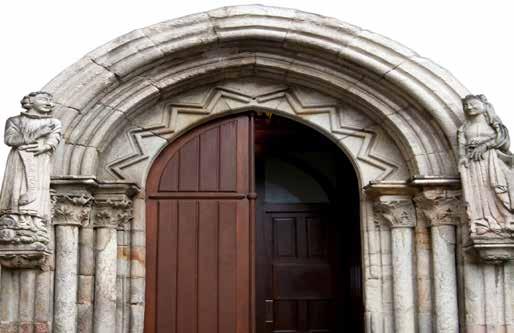
Giving appreciated stock to your parish, Catholic school, agency, the diocese or the Foundation creates a gift that will benefit your desired beneficiary and provide you tax benefits.
For more information, go to www.charlottediocese.givingplan.net
at 704/370-3364.
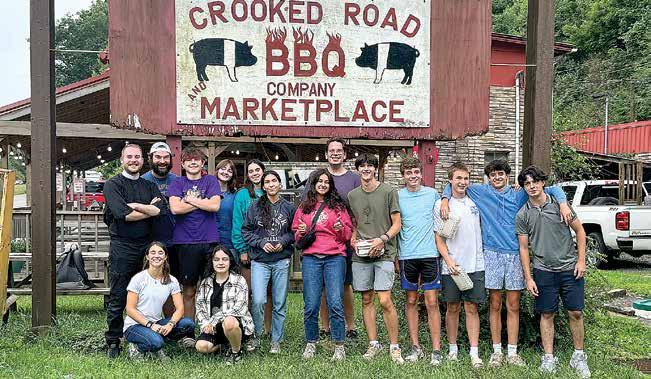
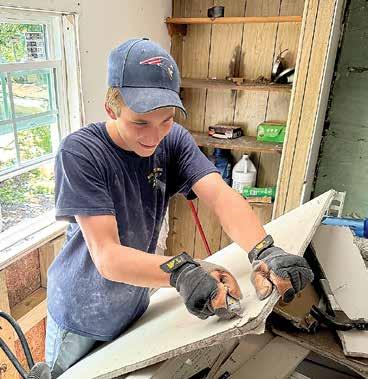
HUNTERSVILLE — This summer, 12 students from Christ the King High School traveled to Jenkins, Kentucky, for a mission trip from July 29 to Aug. 3. The trip, organized through Catholic Mission Trips Inc., gave students a chance to serve some of the most underprivileged families in Appalachia, one of the most underdeveloped regions in the United States. Appalachia has been a focus for mission work since Mother Teresa opened her first rural mission in the area.
During their time in Jenkins, the students worked on projects that included repairing drywall, framing, flooring and building railings.
“I was astounded by the dedication to service and the love our students brought to the families we met as soon as we stepped foot in Jenkins,” said Daniel Torres, the Campus Ministry coordinator who accompanied the group. “While we spent most of the week working on construction projects, the real impact was the relationships we built.”
The theme for the week was “Enthroning the Name of Jesus,” and the students were encouraged to reflect on how to bring Christ’s love into their own lives and those of everyone they serve. The Missionaries of Charity leading the trip shared lessons on how to enthrone Jesus’ name in families, among strangers and in everyday life. These lessons were deepened through Mass, Adoration, confession and moments of personal reflection.
Reflecting on the experience, student Katie Millar said, “I personally realized just how much God is able to transform people. Seeing the kids with so much hope and love really changed the way I see my life. We have so much privilege, and we should use that to help others.”
“By the end of the week, it was clear that our students were set on fire to serve in Jesus’s name in our own community,” Torres said. “We also grew closer together as a school community, with many students forming new and invaluable friendships.”
The 12 students returned home changed,
not only by the people they served but by the lessons they learned about faith, service and love.
“I feel like I’m able to see God more in every person I encounter,” said student
Isabella Sanchez. “It’s made me really reflect on what my charism is and what God wants me to do with my life in order to serve Him.”
— Christ the King High School

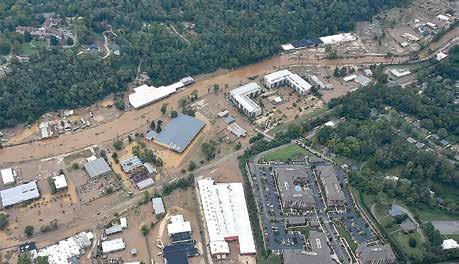
N.C. DEPARTMENT OF TRANSPORTATION
An aerial view captures some of the devastation wrought by Tropical Storm Helene. Catholics from within the Diocese of Charlotte, across the country and around the world have joined together to help those impacted by the storm.
LIZ CHANDLER
lchandler@rcdoc.org
across the country have banded together with the Diocese of Charlotte to deliver the largest humanitarian effort in the diocese’s history to help the people of western North Carolina recover from Tropical Storm Helene.
People from all 50 states and six countries have donated time, talent and treasure – contributing $3.8 million so far – to response-and-recovery efforts led by the diocese’s parishes, schools, central administration and its Catholic Charities agency.
Since Helene hit North Carolina, the diocese has marshaled staff and volunteers from across the state and beyond to provide emergency supplies of food, water and other items to address basic needs of storm victims.
The diocese’s first truckload of supplies from Charlotte arrived in Hendersonville 48 hours after the storm – an effort that quickly grew to a hub-and-spoke operation delivering 48 boxtrucks and 16 pickups and trailer loads of supplies to Asheville, Boone, Brevard, Hendersonville, Linville, Swannanoa and Waynesville. Now, the diocese is shifting its focus from providing basics to the arduous task of rebuilding lives – an effort to be led by Catholic Charities, which has been doing such work in western North Carolina for 75 years.
by the record rainfall that transformed rivers, streams and low-lying areas into raging waterways. The storm left billions in property damage across the U.S. and nearly 100 confirmed dead in North Carolina alone, with many others still unaccounted for – including at least one parishioner, Gabriel Gonzales, whose jeep was found buried in mud (see page 16). Many areas remain without power and water after three weeks.
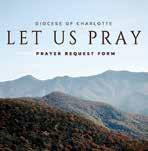
Add your prayers
“The stories of outreach to address that devastation have been inspirational,” Bishop Martin said in an email to the diocese’s 160 priests. “The resurrection is being made real by your willingness to give of yourselves in love of those most in need. While some of the immediate needs have been cared for, our longer-term walking with the people affected … remains an important ministry of our local Church.” (Editor’s note: Bishop Martin talks more about the need to accompany storm victims: see page 27.)
The diocese has an online prayer request form at www.charlottediocese.org/ form-prayer-request
With more than half of the diocese’s territory declared FEMA disaster areas, Bishop Michael Martin, OFM Conv., is launching a “sister parish” program, where parishes that were spared by the storm pair with parishes that were hit hard – to help them financially, materially and spiritually for at least six months.
The diocese covers the western half of North Carolina, and while most of its 92 churches suffered little damage, the people and communities served by many of these churches were devastated
Last week, navigating wreckage and cadaver search teams, local and national Catholic Charities toured storm-damaged areas as the agency sets up outreach operations to find and help families access available government and charitable resources.
“We will stand beside you and help you find the support you need to recover and rebuild,” Gerry Carter, executive director and CEO of the diocese’s Catholic Charities agency, pledged in a recent message to storm victims. “It’s been overwhelming to learn about the loss of lives, homes, and jobs … (but) our incredible staff continues
‘You are not Focus shifts from recovery

to work tirelessly to deliver lifesaving supplies and support.”
Armed with the financial boost from donors across the country and beyond, including a $500,000 grant from Catholic Charities USA, caseworkers will fan out across the mountain regions to find and evaluate the needs of individual families affected by the storm.
Caseworkers – including three who lost their own homes in the storm – will help people apply for and troubleshoot access to FEMA and other government resources, and will evaluate people’s needs for food/water, shelter, improved safety, employment, childcare, medical and special personal needs. They will focus on those in greatest need, with an eye on
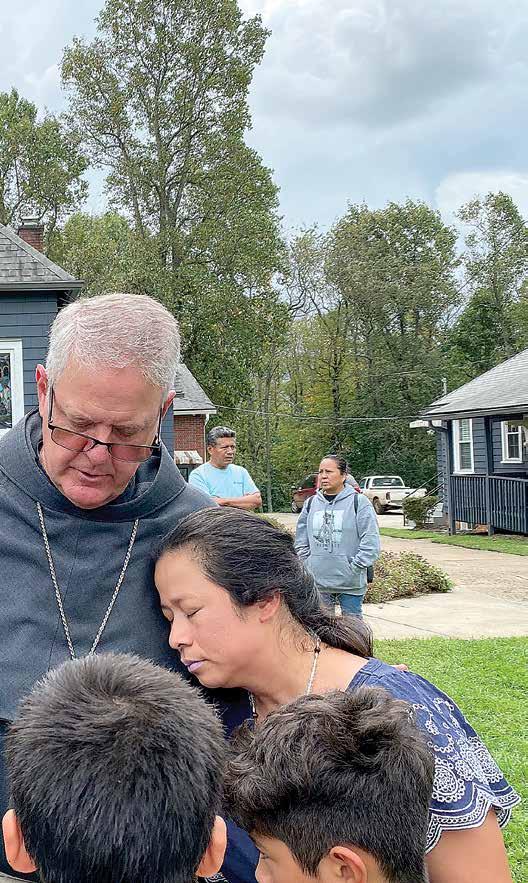
people with limited English and capacity to navigate various complex aid programs, such as some in the Hispanic community.
“It’s gratifying to see how all parts of the Church have come together to work in concert to help our brothers and sisters in Western North Carolina,” Carter said, “from the Knights of Columbus, the Knights of Malta and other service
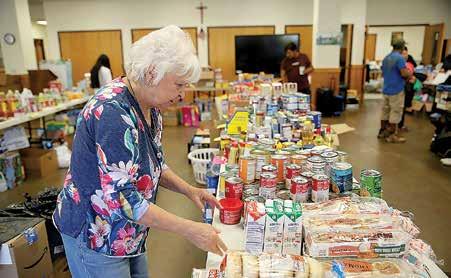
While parishes will continue to provide many items that remain in short supply in western North Carolina in the wake of Tropical Storm Helene, the focus of relief efforts is shifting toward long-term support and solutions. Here’s how you can help those in need, or get assistance if you live in the affected areas: Donate money
Monetary donations are the fastest, most flexible and most effective way to support emergency relief efforts. Local responders on the ground can use the funds to help people with immediate as well as long-term needs. Give securely online: www.ccdoc.org/helenerelief. Several churches have also established ways to give directly to their congregations. Visit www.catholicnewsherald.com for a list.
Need help?
n North Carolina 2-1-1: Use the state’s info hotline (call 211 and press 1, or go online to www. nc211.org) to find information about getting food, water and shelter; finding loved ones; checking current road conditions; filing damage and insurance claims; and other issues. n FEMA assistance: Go to www.disasterassistance.gov, call 800-621-3362, or download and apply through the FEMA app.

organizations, to our parishes and schools, to Catholic Charities and our diocesan leadership. We’re all one Church, serving as the hands and feet of our Lord.”
The diocese’s clergy are also traversing ravaged areas to bring supplies, sacraments and spiritual uplift to Catholics and non-Catholics alike. All the while, they’re steadfastly saying Mass to help
people restore the rhythm of their faith life and elevate prayers for people lost and challenges ahead. A prayer request page has also been set up on the diocese’s website.
Monsignor Patrick Winslow, who has piloted much of the diocese’s storm response, has consulted with Church leaders in Louisiana who went through Hurricane Katrina. In a letter to priests, he shared sobering news that people’s emotional recovery from the storm will likely take a year.
Survivors of Katrina, the most catastrophic storm on record in the U.S., described three phases of recovery after the storm as “Respond, Reopen, Recover,”
focusing first on immediate needs, then on short-term and long-term needs.
“As priests and deacons who have served in these regions, we have observed with shock and sadness the images that are now being shared,” said Monsignor Winslow, the diocese’s vicar general and chancellor who previously served mountain parishes in Tryon and Sparta. “There are a number of pastoral challenges that lie ahead … since the relief efforts will be going on for some time and the human toll will take even longer to address.”
As they visited parishes in the damaged areas, Monsignor Winslow and the bishop emphasized the need for accompaniment and reliance on the Holy Spirit.
“Know that the rest of the world is very much with you,” Bishop Martin told the congregation at Mass in Waynesville on Oct. 6. “There are people all over our diocese, all over our country and all over the world who are reaching out now to let all of you know that you are not alone.”
The devastation from Helene “may seem overwhelming,” he said, yet “that is never beyond the scope of the power of the Holy Spirit to transform into something greater.”
Stories of the Holy Spirit at work abound across the Diocese of Charlotte. Read more on the following pages...

LIZ CHANDLER lchandler@rcdoc.org
SWANNANOA — Ashevillearea parishioner Gabriel Gonzalez disappeared the day Helene hit. He’d gone to work in driving rain at Ingles Markets’ distribution center on the banks of the Swannanoa River – where coworkers called him “the happy one” because he was always singing as he loaded tractor-trailers for the regional grocery store chain.
Now, his friends and fellow parishioners fear the worst: They found Gabriel’s red jeep four days after the storm, buried in mud along the river, which rose 19 feet during the storm to a level not seen since 1791 and roughly 10 feet higher than the National Weather Service’s major flood stage.
Witnesses who live along the river told Gabriel’s friends they saw a red jeep floating down the river and that someone had tried to get the driver to jump. “But the current took him,” said Antonio Garcia, the Asheville-area Hispanic ministry coordinator for the Diocese of Charlotte.
Witnesses also told Garcia they saw rescuers pull a lifeless man from the jeep the next day, he said. “We are heartbroken,” Garcia said. “We are waiting official word from the county, but they are struggling to identify everybody they have found.”
Indeed, Gabriel Gonzalez, 52, of Arden is one of countless people still unaccounted for after Helene swept through on Sept. 27. But friends have posted a GoFundMe page to raise money to transport Gabriel’s body back to his native
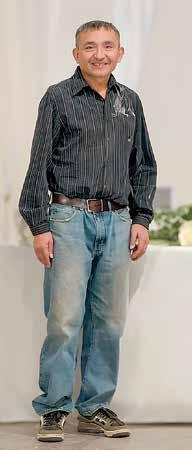
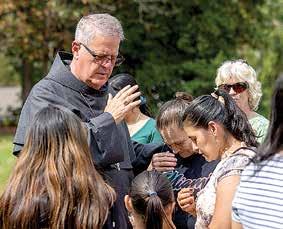
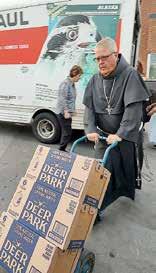
PROVIDED AND BY GABRIEL SWINNEY | CATHOLIC NEWS HERALD
‘humbly and charitably’

PHOTOS PROVIDED
El Salvador once identification is made.
Garcia and his brother Ulices grew up with Gabriel in El Salvador, in a Franciscan parish where they attended Catholic youth camps, sang Franciscan songs, and where Gabriel served as a catechist teaching the faith to children. He left school at a young age to work in the fields to help support his family.
Gabriel moved to the U.S. in 1998, where the Garcias say he lived
simply, in an apartment, “without presumption” – working, growing vegetables and sending money home to support his mother, two sisters and three nieces.
“He was very responsible. He worked hard, and he especially loved to work the land because he felt the connection with his roots,” Antonio Garcia said. “Every summer he would plant corn and beans and tomatoes, and he would share them with everybody.”
Donations for long-term recovery and rebuilding efforts have surpassed $3.8 million. People from all 50 states, plus Canada, the United Kingdom, South Africa, Japan and Australia have contributed to the diocese’s online appeal, while the Diocese of Jackson, Mississippi, took up a second collection and schools outside the diocese also contributed. The Diocese of Charlotte’s Catholic Charities agency received $500,000 in disaster relief funding from Catholic Charities USA as it evolves its emergency storm response toward long-term recovery efforts. A special collection in parishes the weekend of Oct. 5-6 raised $740,000.
Gabriel also embraced St. Francis’ model of living “humbly and charitably,” Ulices Garcia said. He consistently attended Spanish Masses in the Asheville area, at St. Eugene or St. Barnabas and sometimes at St. Lawrence Basilica.
“I have a deep void in my heart,” Ulices Garcia said. “He was always there for me, always reaching out…I thought of him as a brother.”
Gabriel loved the U.S. but was also proud of where he came from. He often wore a blue-andwhite striped shirt resembling the Salvadorian flag or one emblazoned with “la flor de izote,” his country’s national flower.
“He was very joyful, always smiling. And he loved soccer,” Ulices Garcia said. “Even though he didn’t have children, he supported his nieces in El Salvador, helped them go to college.
“He was very responsible. Like even in bad weather, he went to work that day.”
Nohemi Luna was sad to hear about Gabriel. A parishioner at St. Margaret Mary Church in Swannanoa, she worked with Gabriel at Ingles – and she too got swept up by water on her way to work.
“The big wave took me with my car,” Luna said tearfully. “I thought it was the end. But the water just picked me up and flipped me around and pushed me back out.”
The Garcias are working with the Salvadorian Consulate to find their friend – and send him home.
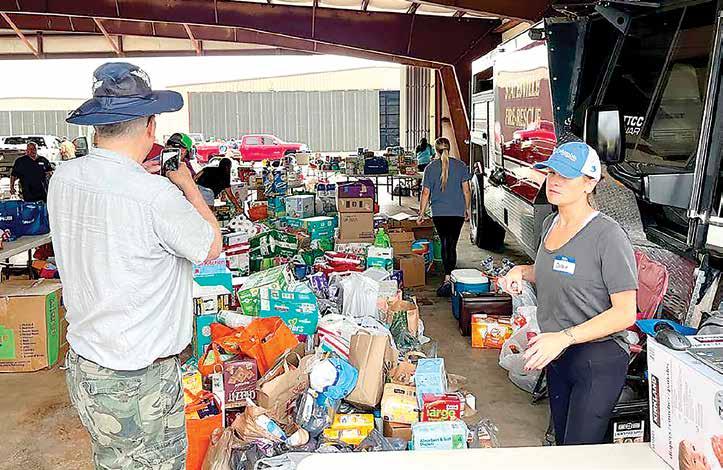
Parishes have been crucial to supporting those impacted by Helene. St. Mark, St. Gabriel and St. Matthew parishes in the Charlotte area were among the first to start sending supplies into western North Carolina – with St. Mark teaming up to help St. John the Evangelist in Waynesville (above) and St. Gabriel teaming up with St. Margaret Mary in Swannanoa, for example. Other parishes from the Triad to the foothills quickly followed suit.
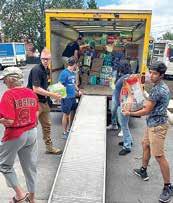
Immaculata School in Hendersonville (left) and churches in western North Carolina converted their parish halls into aid distribution sites for their communities thanks to truckloads of emergency supplies arriving daily from the eastern side of the diocese.
And parishes including St. Barnabas in Arden rapidly expanded their local St. Vincent de Paul Food Pantry operations to become a lifeline for their community. Hundreds of volunteers – including the Missionaries of Charity (right), entire families and people from other states – stepped in to help distribute food, water, diapers and other necessities.
Now, as recovery efforts shift, Bishop Martin is calling on parishes to form “sister” partnerships for at least the next six months.
Even if church buildings suffered only minor damage, western North
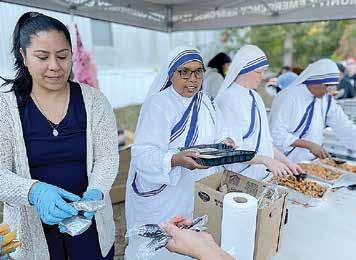
Carolina parishes are facing “fallout” because offertory giving is down yet the need for services is up, he noted in an Oct. 10 email to pastors. In response, partnered parishes can hold second collections to help offset lost operating revenue in their sister parish, offer monthly Holy Hours to pray for their sister parish, check in with the parish regularly about the need for pastoral help or volunteers, and more.
The key, Bishop Martin said, is for the diocese to band together to provide long-term material and spiritual support to the affected parishes and communities – accompanying them through the challenges of disaster recovery, “making a difference in that process in the months to come.”

In the immediate aftermath of Tropical Storm Helene, people and organizations from around the diocese and across the country stepped up to serve basic needs of those impacted.
The team at Immaculate Conception Parish served over 10,000 people and provided 5,000 hot meals in just nine days at a disaster relief distribution site next door at Immaculata Catholic School.
Immaculata’s Principal Margaret Beale, Father David O’Connor, parochial vicar at Immaculate Conception, and teachers as well as volunteers from near and far, like Obie, a lay member of the Missionaries of Charity who drove from Louisville, Kentucky, served food, supplies and comfort.
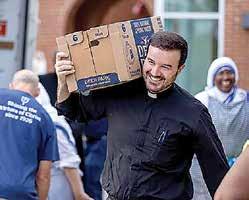

Priests from across the diocese stepped up to serve in areas of need. (Pictured from top) Father Miguel Sanchez, the bishop’s priest-secretary, gladly joined in to unload a truck filled with supplies at Immaculata Catholic School in Hendersonville. Father Richard Sutter, pastor of St. Gabriel in Charlotte, spent three days in Swannanoa, where he celebrated Mass at a mobile home park where more than 30 homes were flooded, helped get supplies, and organized a child’s birthday party. Father Christopher Brock blesses a truckload of supplies at Bishop McGuinness High School. Sacramental life went on at St. Eugene Parish in Asheville, according to pastor Father Patrick Cahill. Two weddings were conducted by candlelight the weekend of Sept. 28-29. Five babies have since been baptized, and confirmation went on Oct. 17. “At least the graces of the sacraments are happening,” Father Cahill said. “I think that’s very important.”
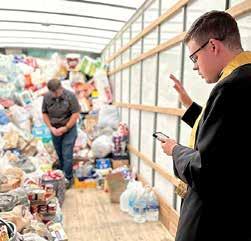
As laundry began to mount for residents, many of whom lacked power and water, LG Electronics brought its “LG Laundry Relief Zone” – a free mobile laundry trailer offered in times of disaster – to St. Lawrence Basilica in Asheville. The trailer handled 300 loads of laundry in its first three days, said coordinator Christina Wright.
Wright and three other volunteers – two from Tampa, one from nearby Mars Hill – are overseeing the effort. All have deployed to other flood and hurricane disaster areas before and volunteered for Asheville “because they just knew the need was catastrophic.”
“Parents are coming in to wash their children’s clothes and their own, and the smiles have been amazing,” Wright said.
LIZ CHANDLER lchandler@rcdoc.org
ASHEVILLE — Noele Aabye was sitting with her dad at the dining room table, gearing up to work from home as Tropical Storm Helene passed through.
The power was out, and she’d been texting and calling clients and co-workers at Catholic Charities, so she walked out to her car to charge her phone.
A cracking sound made her look up, just as a large poplar sliced through her dining room. She froze, then freaked.
Was her dad hit?
Were her husband and teenage son OK?
Upstairs, her husband panicked, too. Last he’d seen, both his wife and father-inlaw were sitting together in the room now occupied by the trunk of a tree that for years had brought the family joy through its tulip blooms.
Soon, everybody found each other, alive and safe. And while the trauma remains with her, what happened next was even more remarkable.
Across town, in Biltmore Village, several of Aabye’s clients were moving upstairs in a hotel away from rising floodwaters. They were refugees from Venezuela, fleeing their homeland, and assigned by the U.S. government to be resettled in Asheville by Catholic Charities’ refugee resettlement program.
Rescuers came by boat, ferrying her clients to safety. Now, the refugees would need yet another place to land.
Over the next several days, with no power or water in Asheville, the Catholic Charities resettlement team worked to relocate 40 “new arrival” refugees to Charlotte. They found housing, drove clients down the mountains in vans, checked them into hotels, then went shopping for basic necessities the refugees would need to restart their lives.
Aabye, a resettlement supervisor, helped pilot the relocation.
The whole Catholic Charities team, she says, went into overdrive across the Diocese of Charlotte – including two colleagues in Asheville who’d also lost their homes in the storm.
Aabye is almost infamous for going the extra mile for clients, colleagues say. Responding round the clock. Delivering goods and services. Working crazy hours to the point that her son leaves little notes
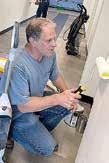
As communities across western North Carolina begin the long recovery from Tropical Storm Helene, students returned to Immaculata Catholic School on Oct. 16 –and students from Asheville Catholic School joined them. The schools will “temporarily merge,” their principals Margaret Beale and Melissa Stuart announced Oct. 8, until water service can be restored at Asheville Catholic School.
It’s unclear how long the arrangement will remain in place. Asheville’s municipal water
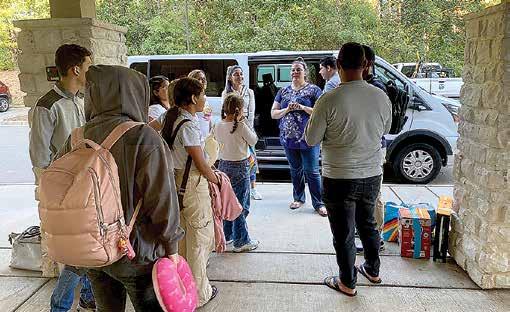

when he goes to bed: “Missed you, mom. Proud of you.”
At a hotel in Matthews on Oct. 5, Aabye spent two hours checking in refugee families.
She worried about her house. She worried about her guinea pigs, who’d been whisked to a vet after the storm. She worried about how Catholic Charities’ 300 more-established refugee clients in Asheville had fared. But none of that worry
Noele Aabye, a resettlement supervisor with Catholic Charities, works to check refugees who had been resettled in Asheville into a hotel in Matthews after they were forced to evacuate. Her own home was damaged when a poplar tree crashed through her dining room.
Tropical Storm Helene forced more than 2,100 men and women who are incarcerated in western North Carolina to be moved to institutions in the center and eastern regions of the state because their facilities lost electricity and water. As a result, people involved with prison ministry in the Diocese of Charlotte are working to continue outreach to them in the wake of the storm.
Inmates were moved from AveryMitchell Correctional Institution in Spruce Pine, Craggy Correctional Center in Asheville, Mountain View Correctional Institution in Spruce Pine, the Black Mountain Substance Abuse Treatment Center for Women, and the Western Correctional Center for Women in Swannanoa. Many of the men served by the diocesan prison ministry have been moved to Alexander Correctional Institution in Taylorsville, according to David Coe, temporary coordinator of prison ministry and council chair of the Residents Encounter Christ program in the diocese, a Catholicbased program designed to bring hope and the knowledge of Christ to inmates.
showed as she answered clients’ questions and explained how the next phase of their lives would unfold.
Next up that evening would be a trip to Walmart.
And finally, late that Saturday night, she’d head “home” – to a Charlotte hotel, where her husband and son waited. While it may only be temporary, the refugee resettlement supervisor had become a refugee herself.

system has been offline due to extensive damage from Helene, with no timetable for when it will be functional again. But Asheville Catholic is exploring options including installing a portable water supply and possibly digging a well.
On Oct. 11, leaders and students from Charlotte Catholic High School went to Immaculata to help prepare the school for reopening. Twenty-five Charlotte Catholic 11th and 12th graders moved boxes, cleaned floors, and reorganized classrooms.
One group of inmates studying the faith at Craggy Correctional recently had been introduced to the liturgy, reconciliation and the Eucharist through Father Patrick Cahill at St. Eugene Parish in Asheville. Coe is trying to reach out to the Residents Encounter Christ program at Alexander Correctional to contact those inmates and others. Coe also has been leading a Christ-centered 12-step program at Craggy and wants to continue that outreach to help the men through their recovery.
Family members searching for loved ones who have been moved can find contact information through the N.C. Department of Adult Correction. Visit www. webapps.doc.state.nc.us/opi/ offendersearch.do?method=view. — Christina Lee Knauss

“That’s what we do; it’s part of our mission of service,” said Charlotte Catholic’s President Kurt Telford, who also delivered a check for $10,000 to Immaculata to help with recovery.
Garrett Nowlan, a junior at Charlotte Catholic came to help, too, despite his right arm being in a sling from a football injury.
“We really didn’t get affected by the storm that much,” Nowlan said of the Queen City. “To see a different perspective, you really need to serve. It’s just a good Catholic thing to do.”
LLIZ CHANDLER lchandler@rcdoc.org
os católicos de todo el país se han unido a la Diócesis de Charlotte para llevar a cabo el mayor esfuerzo humanitario en la historia de la diócesis, con el fin de ayudar a la gente del oeste de Carolina del Norte a recuperarse de la Tormenta Tropical Helene. Personas de los 50 estados y de seis países han donado tiempo, talento y recursos, contribuyendo hasta ahora con 3.8 millones de dólares a los esfuerzos de respuesta y recuperación liderados por las parroquias, escuelas, administración central y la agencia de Caridades Católicas de la diócesis.
Desde que Helene impactó Carolina del Norte, la diócesis ha movilizado personal y voluntarios de todo el estado y más allá para proporcionar suministros de emergencia de alimentos, agua y otros artículos para atender las necesidades básicas de las víctimas de la tormenta. La primera carga de suministros de la diócesis desde Charlotte llegó a Hendersonville 48 horas después de la tormenta, un esfuerzo que rápidamente se convirtió en una operación de distribución que entregó 48 camiones de caja y 16 pickups y remolques de suministros a Asheville, Boone, Brevard, Hendersonville, Linville, Swannanoa y Waynesville. Ahora, la diócesis está cambiando su enfoque de proporcionar lo básico a la ardua tarea de reconstruir vidas, un esfuerzo que será liderado por Caridades Católicas, que ha estado realizando este trabajo en el oeste de Carolina del Norte durante 75 años. Con más de la mitad del territorio de la diócesis declarado áreas de desastre por FEMA, el obispo Michael Martin, OFM Conv., está lanzando un programa de “parroquia hermana”, donde las parroquias que fueron salvadas por la tormenta se emparejan con parroquias que fueron gravemente afectadas, para ayudarlas financiera, material y espiritualmente durante al menos seis meses. La diócesis cubre la mitad occidental de Carolina del Norte, y aunque la mayoría de sus 92 iglesias sufrieron poco daño, las personas y comunidades atendidas por muchas de estas iglesias fueron devastadas por las lluvias récord que transformaron ríos, arroyos y áreas de bajo nivel en caudalosos cuerpos de agua. La tormenta dejó daños por miles de millones en propiedades en todo Estados Unidos y casi 100 muertos confirmados solo en Carolina del Norte, con muchos otros aún desaparecidos, incluyendo al menos un feligrés, Gabriel Gonzales, cuyo jeep fue encontrado enterrado en el barro. Muchas áreas siguen sin electricidad y agua después de tres semanas.
“Las historias de alcance para abordar esa devastación han sido inspiradoras”, dijo el
Mientras muchos artículos siguen escasos en el oeste de Carolina del Norte en las semanas posteriores a la tormenta tropical Helene, el enfoque de los esfuerzos de ayuda se está trasladando hacia el apoyo y soluciones a largo plazo. Aquí tienes cómo puedes ayudar a quienes lo necesitan o recibir asistencia si vives en las áreas afectadas:
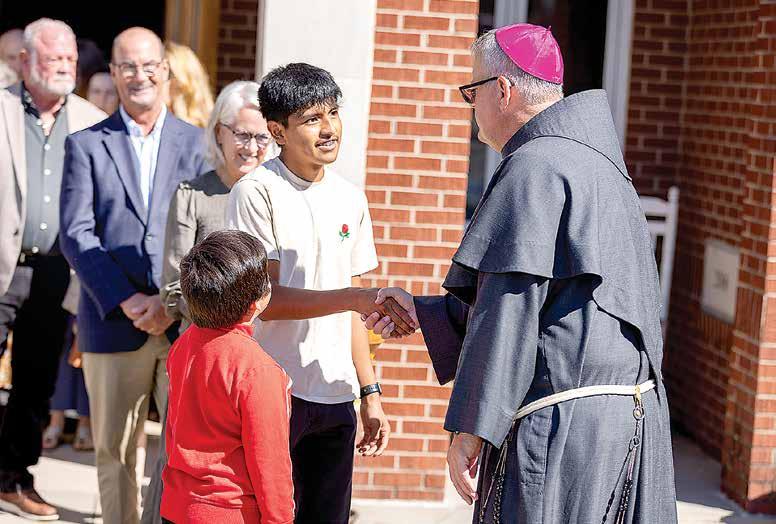
obispo Martin en un correo electrónico a los 160 sacerdotes de la diócesis. “La resurrección se está haciendo real por su disposición a dar de ustedes mismos en amor a aquellos que más lo necesitan. Si bien algunas de las necesidades inmediatas han sido atendidas, nuestro acompañamiento a las personas afectadas… sigue siendo un ministerio importante de nuestra Iglesia local.”
La semana pasada, navegando entre los escombros y los equipos de búsqueda de cadáveres, Caridades Católicas locales y nacionales recorrieron áreas dañadas por la tormenta mientras la agencia establece operaciones de alcance para encontrar y ayudar a las familias a acceder a los recursos gubernamentales y caritativos disponibles. “Estaremos a su lado y les ayudaremos a encontrar el apoyo que necesitan para recuperarse y reconstruirse”, prometió Gerry Carter, director ejecutivo y CEO de la agencia de Caridades Católicas de la diócesis,
Donar dinero
Las donaciones monetarias son la forma más rápida, flexible y efectiva de apoyar los esfuerzos de ayuda de emergencia; los respondedores locales en el terreno pueden utilizar los fondos para ayudar a las personas con necesidades inmediatas así como a largo plazo. Dona de manera segura online: www. ccdoc.org/helenerelief
Varias iglesias han establecido formas de donar directamente a sus congregaciones. Visita www.catholicnewsherald.com para obtener una lista.
en un mensaje reciente a las víctimas de la tormenta. “Ha sido abrumador enterarse de la pérdida de vidas, hogares y empleos… (pero) nuestro increíble personal continúa trabajando incansablemente para entregar suministros y apoyo que salvan vidas.” Armados con el impulso financiero de donantes de todo el país y más allá, incluido un subsidio de 500,000 dólares de Caridades Católicas USA, los trabajadores sociales se dispersarán por las regiones montañosas para encontrar y evaluar las necesidades de las familias individuales afectadas por la tormenta. Los trabajadores sociales, incluidos tres que perdieron sus propios hogares en la tormenta, ayudarán a las personas a solicitar y solucionar problemas para acceder a los recursos de FEMA y otros recursos gubernamentales, y evaluarán las necesidades de las personas en cuanto a alimentos/agua, refugio, seguridad mejorada, empleo, cuidado de niños, necesidades médicas y necesidades
¿Necesitas ayuda?
n En Carolina del Norte 2-1-1: Utiliza la línea de información del estado (llama al 211 y presiona 1, o visita www.nc211.org) para encontrar información sobre cómo obtener alimentos, agua y refugio; localizar a seres queridos; verificar las condiciones actuales de las carreteras; presentar reclamaciones por daños y seguros; y otros temas. n Asistencia de FEMA: Visita www. disasterassistance.gov, llama al 800-6213362 o descarga y solicita a través de la aplicación de FEMA.
personales especiales. Se enfocarán en aquellos que están en mayor necesidad, prestando atención a las personas con un inglés limitado y capacidad para navegar por varios programas de ayuda complejos, como algunos en la comunidad hispana.
“Es gratificante ver cómo todas las partes de la Iglesia se han unido para trabajar en conjunto para ayudar a nuestros hermanos y hermanas en el oeste de Carolina del Norte”, dijo Carter, “desde los Caballeros de Colón, los Caballeros de Malta y otras organizaciones de servicio, hasta nuestras parroquias y escuelas, hasta Caridades Católicas y nuestro liderazgo diocesano. Somos una sola Iglesia, sirviendo como las manos y los pies de nuestro Señor.”
El clero de la diócesis también está recorriendo áreas devastadas para llevar suministros, sacramentos y aliento espiritual
RECONSTRUCCIÓN, PASA A LA PÁGINA 28
La diócesis tiene un formulario de solicitud de oración en línea en www.charlottediocese. org/form-prayer-request. Las solicitudes se compartirán en el sitio web diocesano y en nuestros otros canales de comunicación, donde se alentará a las iglesias, grupos de oración y al público a orar por aquellos en nuestras comunidades que han sido afectados por la tormenta.
EDITOR’S NOTE
Catholic Charities Diocese of Charlotte is highlighting the seven themes of Catholic Social Teaching as part of its year-long 75th anniversary celebration. This week, the focus is on “Life and Dignity of the Human Person.” The Church proclaims that human life is sacred and that the dignity of the human person is the foundation of a moral vision for society. This belief is the foundation of all the principles of our social teaching.
An estimated 2.8 billion people –approximately one-third of the global population – struggle to get enough food to sustain themselves each day.
Of that number, 1.2 million people are North Carolinians, including about 394,000 children – about 10.9% of the population, according to state health officials.
The Church teaches that the right to food and water that is safe, nutritious, affordable and accessible is a right inherent to everyone everywhere. In his annual message for World Food Day on Oct. 16, Pope Francis reiterated this basic human right, saying that it is important to uphold the right to food if we are to uphold the life and dignity of every person.
Catholic Charities Diocese of Charlotte strives to protect this rig=ht by working to alleviate hunger in several ways.
Through its food pantries and community gardens throughout the diocese, as well as its “Transition Out of Poverty” program, Catholic Charities not only gives groceries to get people through the week, but provides help over the long term to improve their overall food security.
In this past quarter (July to September), food pantries in Charlotte, Winston-Salem and Asheville have provided emergency food aid to 1,215 families, comprised of 2,496 children and 3,374 adults. Besides non-perishable food items, the pantries also provide essentials not covered by government assistance, such as soap and other toiletries.
“Catholic Charities believes that healthy, nutritious food should be available to everyone,” said Social Concerns and Advocacy Director Joe Purello. “Food pantries and food banks are a critical lifeline that enables families to fill gaps in their budgets and address the challenges of food insecurity.”
Community gardens in Asheville and Winston-Salem also provide fresh vegetables – including tomatoes, okra, peppers, beans, cucumbers, watermelons, even a few flowers – to augment the grocery staples that Catholic Charities’ food pantries distribute to families in need.
These volunteer-driven efforts are a crucial part of Catholic Charities’ dayto-day efforts to reduce hunger in our community.
Elsa and Hernan Sabio, who have volunteered at Winston-Salem’s food pantry for a decade and at its community garden since its inception, appreciate how the extra effort helps neighbors in need.
“We were aware that some of the population that we serve in the food pantry may not have access to the more naturally grown foods, so we thought if something can be grown and be made available fresh, too, that would be great,” Hernan Sabio told the Catholic News Herald. “That was the seed of how it got started, and it made a lot of sense to us.”
Added Elsa Sabio, “It’s a good way of
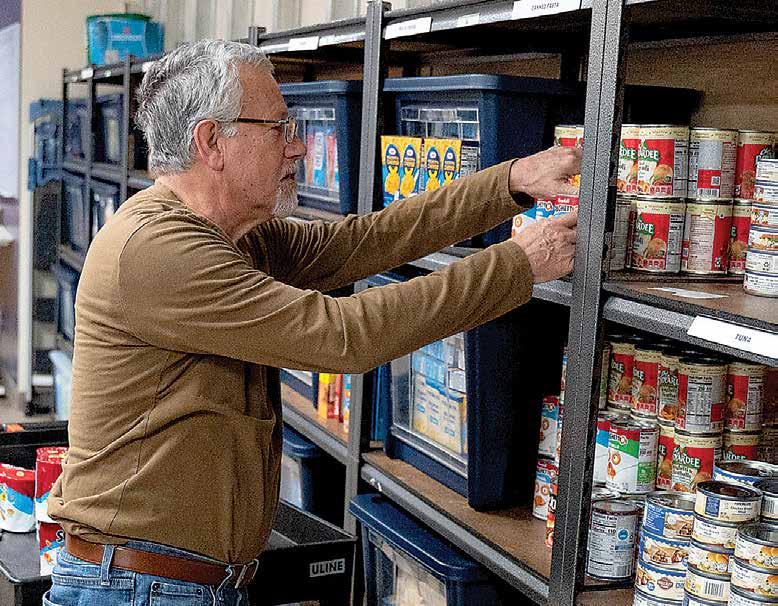
location provides fresh vegetables during the growing season to augment the grocery staples it distributes to people in need.
providing food to those who need it, but it’s more than just the produce. It’s from our garden. We have put our love into growing it.”
Beyond immediate food assistance, Catholic Charities’ “Transition Out of Poverty” program offers one-on-one attention and wrap-around services to overcome obstacles that trap people in the cycle of poverty – whether that is the lack of educational opportunities, a driver’s license, affordable healthcare, or safe and affordable housing. Trained Catholic Charities staff guide individuals to map out a custom, long-term plan, then mentor and accompany them each step of the way, up to a year for most people.
In the past year, 34 households were served through this intensive, case management-based TOP program. Another way that the diocese works to alleviate hunger is through its participation in Catholic Relief Services’ Rice Bowl program each Lent. Catholic Relief Services, or CRS for short, is the international humanitarian organization of the U.S. Conference of Catholic Bishops. CRS works to ensure the “right for foods” both at home and abroad, designating a great deal of its resources
to providing food aid and promoting agricultural development in over 40 countries where CRS has operations.
Parishes that participate in the CRS Lenten Program each year help to provide the funds needed by CRS to fight hunger around the world. And 25% of the funds help fund anti-poverty efforts in the Charlotte diocese, through CRS Mini-Grants.
In the past year $14,000 in grant funds went to projects in Albemarle, Arden, Asheville, Belmont, Charlotte, Linville, North Wilkesboro and Salisbury. Go to www.ccdoc.org/cchdcrs to find information on Catholic Charities CRS Mini-Grants Program, including how to apply for grants (email submission deadline is Nov. 15).
“These grants of up to $1,000 provide Catholic parishes with extra funds to help those struggling to make ends meet in their local communities,” Purello said. “Providing food and other necessities to our brothers and sisters in need is a requirement of our faith (Mt 25:37). Throughout our diocese, parishes and Catholic Charities’ offices are blessed with generous donations and volunteers who put their faith into action through the works of mercy.”
— David Long and Patricia L. Guilfoyle
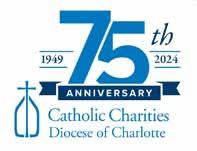
Get involved with Catholic Charities
Join Catholic Charities in its mission to help those in need and spread the love of Christ:
LEARN MORE: Visit www.ccdoc.org to discover how Catholic Charities is making a difference in the Diocese of Charlotte.
DONATE: Consider donating funds to Catholic Charities at www.ccdoc.org/donate. Get details on how to donate food at www.ccdoc.org/donate-grocery-items.
VOLUNTEER: Make a direct impact by volunteering with Catholic Charities’ food pantries in Asheville, Charlotte or Winston-Salem. Learn more about volunteer opportunities at www.ccdoc.org/volunteer or call 704-370-3262 (Charlotte), 828-255-0146 (Asheville), or 336-727-0705 (Winston-Salem). Note: The Asheville Food Pantry is temporarily closed in the aftermath of Hurricane Helene.



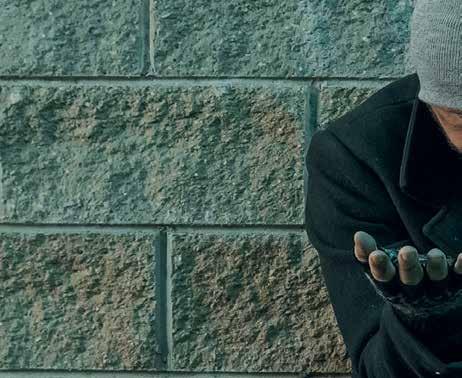







MIKE LATONA OSV News
ITHACA, N.Y. — While cleaning out your house or a loved one’s, you come across a batch of rosaries, crucifixes and other religious artifacts. You hesitate to throw them out, recoiling at the thought of treating such spiritually significant items as mere garbage.
Yet you may not wish to keep them for yourself.
What to do?
One popular option – as Erika Lindsell knows from experience – is to leave the goods at the local parish. Lindsell, the administrative assistant at Immaculate Conception in Ithaca, has often found boxes full of religious objects on the office doorstep upon arriving for work.
“People leave stuff there figuring the church will know what to do with it,” Lindsell remarked. The rub, she said, is that it’s not so simple for parishes to place the objects, especially if there are large quantities.
Earlier this year, Lindsell received an email from a ministry in Lancaster, Pennsylvania, addressing that very dilemma. The organization, St. Mary Recycle Mission Group, offered to come to Immaculate Conception to pick up unwanted items belonging to the parish and parishioners, repurposing them for
use elsewhere.
St. Mary Recycle Mission Group is operated by Kimberly Walters, a Catholic who formerly lived in the Diocese of Rochester and attended church at Rochester’s Our Lady of Victory Parish. She travels with her husband, Mike, all over the northeastern United States, letting parishes know in advance they’ll be in the area with their pickup truck. Walters and her husband go to as many as 40 churches in a week.
The couple hauls away such used items as vestments, crucifixes, statues, rosaries, chalices, altar ware, candlesticks, tabernacles, relics, monstrances, holy medals and cards, linens, religious pictures, musical instruments and prayer books.
At St. Patrick Church in Victor, New York, the parish published in its bulletin a list of religious items the group would accept for several weeks over the summer in advance of their July 26 pickup date, according to Cathy Fafone, secretary at the parish.
Objects are eventually shipped by request to other churches and individuals, including in Third World countries. Walters said all items are donated, not sold.
The ministry’s website, www. StMaryRecycleMissionGroup.com, offers contact details so those interested
can access a full list of accepted objects, state their needs, and arrange for deliveries and exchanges. Walters prefers to work with objects not needing repairs, although the ministry is able to arrange for some refurbishing. Her local Knights of Columbus council helps with the restoration and placement of items as well as travel expenses; Walters assumes the bulk of the ministry’s operational costs.
The recycling effort got its start after Walters rescued several religious articles in usable condition from a dumpster at a Rochesterarea parish in 2004. She eventually sent hundreds of items to a New Orleans parish that had been devastated by Hurricane Katrina in 2005. The initiative has grown since Walters’ move to Lancaster 18 years ago.
Walters strives to find homes for all her inventory, regardless of knowing which objects have been blessed: “We try not to let anything go to waste.”
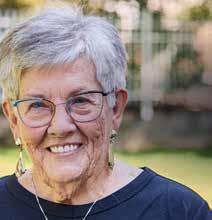

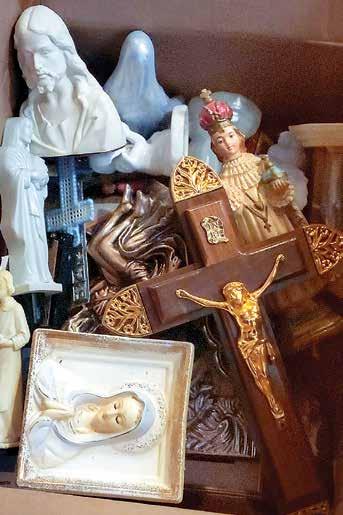
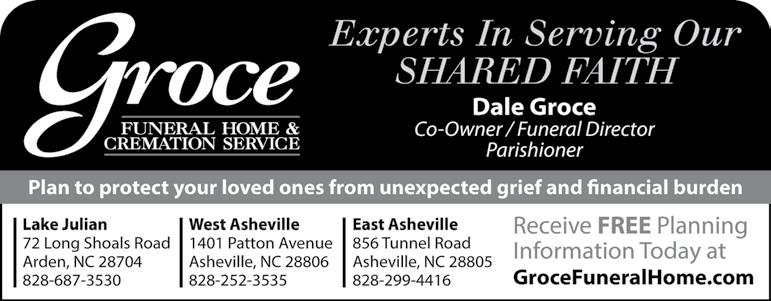
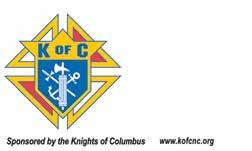

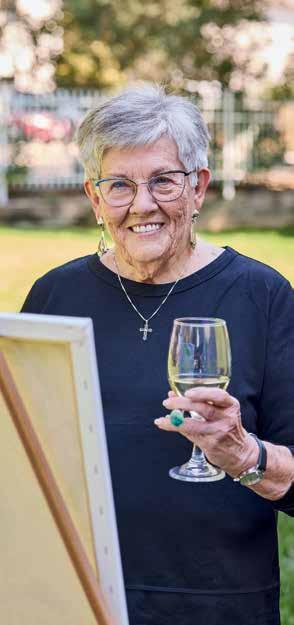

“It has been apparent for several years … that ‘1011’ no longer made sense as our home,” he wrote, pointing to maintenance costs, technological needs and “a desire to be closer to the people we serve throughout the archdiocese.”
NEW YORK — The Archdiocese of New York has sold its longtime office headquarters, in a move first announced by Cardinal Timothy M. Dolan in January. Bloomberg reported the sale Oct. 10, stating that the Terence Cardinal Cooke Building site at 1011 First Ave. in Manhattan had been acquired by Vanbarton Group, a real estate investment firm, for more than $100 million. The site — which currently houses archdiocesan offices, as well as Catholic Charities of New York, the Catholic Near East Welfare Association and St. John the Evangelist Church — will be redeveloped as residential rental units.
The archdiocese confirmed the sale to OSV News in an Oct. 11 email, with director of communications Joseph Zwilling stating that many of the archdiocese’s offices “will be moving to smaller space at 488 Madison Avenue” — located next to St. Patrick’s Cathedral — “in late spring/early summer of 2025.
“Those offices are currently being renovated and prepared,” wrote Zwilling, who did not provide confirmation of the sale price. “Other offices will be housed at other church property throughout the archdiocese; those details are still being finalized.”
In his January announcement to the faithful, Cardinal Dolan said the sale of the archdiocesan headquarters on First Avenue was a prudent and long-considered move.
SAN FRANCISCO — Archbishop Salvatore J. Cordileone of San Francisco is urging all “faithful Catholics” to vote no on a November ballot proposition that he and other Catholic leaders say targets two pro-life clinics in the city. Proposition O, also known as the San Francisco Reproductive Freedom Act, would establish “comprehensive reproductive freedom as San Francisco’s official policy,” says the measure, which just needs a simple majority to pass.
Mayor London Breed introduced the measure in June, two years after the U.S. Supreme Court in its Dobbs decision overturned Roe v. Wade. She said San Francisco “continues to be a leader in supporting reproductive rights, and we will not tolerate any level of disruption.” It would require signs be placed in the public right of way that single out pro-life clinics “as not providing the full range of reproductive rights because they do not do abortions or refer for abortion,” Archbishop Cordileone said in an Oct. 3 video message. These centers “would also be singled out on a Department of Public Health website,” he said, noting that the city’s two pro-life clinics being “targeted by Proposition O” are both licensed medical facilities and “help women, children, and the entire family without regard to ability to pay.” “Did the proposition’s authors truly believe in choice?” he asked, adding that “having babies is something that falls under reproductive health care.”
— Catholic News Service and OSV News
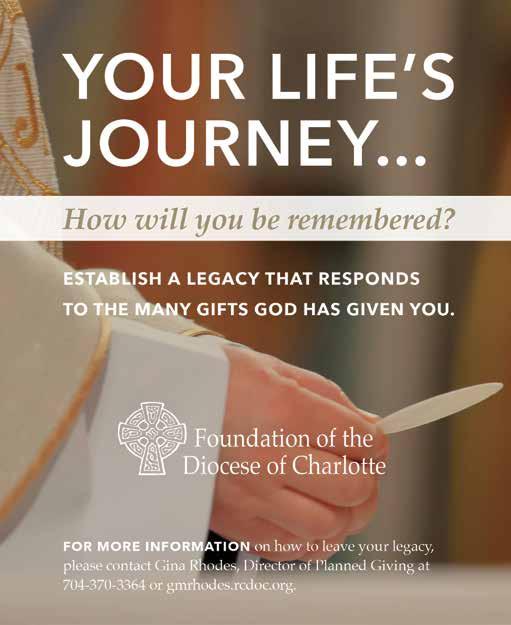


CAROL GLATZ Catholic News Service
VATICAN CITY — Members of the Synod of Bishops must ask, listen to and prayerfully reflect on difficult questions, not dismiss or avoid them, the spiritual adviser to the synod on synodality told them.
“Many people want this synod to give an immediate ‘Yes’ or ‘No’ on various issues,” said Cardinal-designate Timothy Radcliffe in his reflection at the Vatican’s Paul VI Audience Hall Oct. 10.
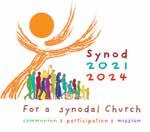
“But that is not how the Church advances into the deep mystery of the Divine Love. We must not run away from the difficult questions,” he said. Instead, like Jesus, “we dwell with these questions in the silence of prayer and mutual listening.”
Listening does not mean having to reply, he said.
Listening is also for learning, stretching one’s imagination “to new ways of being the household of God which has room for everyone.”
“Otherwise, as we say in England, we shall just be rearranging the deck chairs on the Titanic,” said the 79-yearold British theologian, who will be elevated to the College of Cardinals Dec. 8.
The Dominican theologian’s reflection opened the third phase of the monthlong assembly.
Discussions by the more than 360 voting members began Oct. 2 on the foundations of synodality in the Church, followed by looking at ways to make relationships within the Catholic
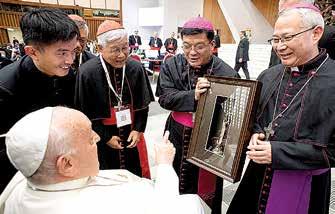
give Pope Francis a gift during a break in the meeting of the Synod of Bishops in the Paul VI Audience Hall at the Vatican.
Church “more transparent and more harmonious, so that our witness may become more credible.”
Over the following days, the members were to discuss the “pathways” or processes that make sure relationships are healthy and strengthened, and that the actions and behaviors of members of the Church are consistent with what the Church professes, Cardinal Jean-Claude Hollerich of Luxembourg, relator general of the synod, said in his presentation opening the next round of small group discussions.
“We know very well what relationships that make us grow look like,” the cardinal said in Italian. Yet, actions speak louder than words.
Day-to-day practices “need to be consistent with our statements, otherwise, people will listen to our words, but they will believe our practices, and this will make our patrimony meaningless and slowly erode it,” he said.
Therefore, “care and consistency” are the two avenues members will use to approach the next section of the working document, he said. They will also discuss more in-depth: integral formation; authentic discernment geared toward mission; more inclusive decision-making processes within a hierarchy; and transparency, accountability and evaluation.
The working document stressed the importance of prioritizing pathways for ongoing formation for all its members to promote a culture of dialogue, transparency and mutual respect at the service of the Church’s evangelizing mission. It also underlined the importance of accountability on all levels and in all aspects of Church life, not just regarding finances and child protection.
And the document emphasized how the Church must involve all its members and even those on the margins in these processes to maintain credibility.
In his reflection on the Canaanite woman’s faith (Mt 15:2128), Cardinal-designate Radcliffe said, “Despite the hostile reception of the disciples, the woman stays” and keeps begging and questioning Jesus, who silently reflects before He answers her plea for help.
The woman “does not give up and go away,” the theologian said. “Please stay, whatever your frustrations with the Church. Go on questioning! Together we shall discover the Lord’s will.”
Follow the Synod
At www.charlottediocese.org/faith-life/synod Read more about the Synod, including a letter to the faithful from Bishop Michael Martin.
JUSTIN MCLELLAN Catholic News Service
ROME — The pope, bishops and priests cannot fully awaken the missionary spirit of the Catholic Church alone, so all Catholics must play a more central role in spreading the Gospel, according to participants in the Synod of Bishops on synodality.
In today’s Church, where “theological competence is not only a privilege of priests and bishops” and where the lay faithful “demand participation and transparency,” synodality must empower all Catholics to actively participate in the church’s mission, said Thomas Söding, a theology professor at Ruhr University Bochum in Germany and a theological expert at the synod.
Speaking at a theological and pastoral forum in Rome organized by the General Secretariat of the Synod, Söding said that the model of the people of God as active participants in the Church’s mission is rooted in the New Testament.
He cited St. Paul’s Letter to the Ephesians to illustrate how early Christians “regard the apostles and prophets as the foundation of the Church, but the Pauline concept of mission set forth that the members of the local churches find their own way in the freedom of the faith.”
In early Christianity, the apostles only stayed in towns and villages briefly to establish a community of believers and left once the communities were “equipped to live their faith,” he said.
The responsibility for growing that community of believers then fell to the people of God, Söding said. “Mission through attraction, that is the key.”
In the apostolic era, “we see the slow emergence of a canon of writings that interpret Jesus, that interpret the Gospel in diverse ways, but in ways that all the churches sense are in fidelity to the truth of Jesus Christ,” said Father Ormond Rush, a professor at Australian Catholic
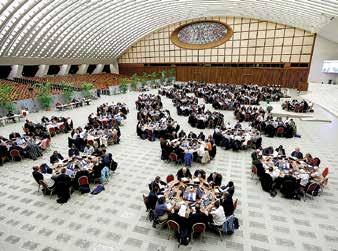
University and another theological expert at the synod. Similarly, he said, the synod on synodality “is an interpreting subject, seeking in its ‘conversations in the spirit’ that spirit’s guidance for understanding for the 21st century” from among the experiences and inputs of synod members.
Father Rush noted that the faithful must be careful to avoid conceiving of the Church as an “ethereal subject floating through time,” unaffected by worldly circumstance, but must also recognize it as something beyond a purely human institution.
“Downplaying the divine element can lead to an understanding of synodality for example as a purely
democratic process whereby majority rules,” he said. “Downplaying the human element, on the other hand, can lead to an understanding of synodality as a purely consultative process, where the true answers to contemporary problems from God’s perspective are known only to the bishops.”
Donata Horak, a professor of canon law at the Collegio Alberoni in Piacenza, Italy, discussed how canon law does not adequately reflect the understanding of the people of God as central to the Church’s mission.
She said that many sections of canon law still refer to the faithful as “subjects” and noted that the structures prescribed by canon law provide minimal opportunities for consultation.
While pastoral councils in local churches are optional, for example, the regulations for mandatory councils, such as parish finance councils, “do not include specific rules to promote transparency,” she said.
“Often these are councils of nominees appointed by the single authority, or if they are elected, they are elected without rules that guarantee the effective candidacy and participation of the whole people of God,” Horak said.
And while synods “are always only consultative, functional to the decision of a singular, monarchical authority,” deliberative councils are “underused” in the Latin Church, she said.
“Synodality is deeper than monarchy, it is deeper than monarchy,” Horak said. “We must rediscover a shared, deliberative vote distributed among different subjects and plural- and inter-ministerial bodies composed on the basis of competence on the matter in question.”
On a local level, pastoral councils should “reflect the people of God, taking into account the areas of a diocese, professions, competencies and different characteristics,” she said. “The hierarchical precept must be re-understood in a dynamic of ecclesial relations that are complex.”
LONDON — Cardinal Vincent Nichols of Westminster has joined leading Catholic politicians and pro-life groups in calling on U.K. Catholics to take immediate and urgent action to oppose an assisted suicide bill which he says will strike ‘fear and trepidation’ into vulnerable people. Labour Member of Parliament Kim Leadbeater is proposing a bill that would give terminally ill people in England and Wales the right to end their life. It will be introduced to the House of Commons Oct. 16, with a vote to take place Nov. 29. The issue was last voted on in 2015, when MPs roundly rejected assisted suicide, with 118 votes for and 330 against. In a pastoral letter read in parishes in his Londonbased Diocese of Westminster, Cardinal Nichols, president of the Bishops’ Conference of England
and Wales, said that “this proposed change in the law may be a source of relief to some. But it will bring great fear and trepidation to many, especially those who have vulnerabilities and those living with disabilities.” Cardinal Nichols also shared his worries “for all medical professionals,” warning that their roles will change profoundly, which he described as “a slow change from a duty to care to a duty to kill.”
VATICAN CITY — Pope Francis announced he would create 21 new cardinals Dec. 7, including a 99-year-old former nuncio and the 44-year-old Ukrainian bishop who heads his church’s eparchy (diocese) in Melbourne, Australia. The 21 cardinals-designate named by the pope on Oct. 6 hail from 18 nations. Eight of the cardinals come from Europe, five from Latin America, five from Asia, two from Africa and just one from North America: Archbishop Francis Leo of Toronto.
VATICAN CITY — Pope Francis and Ukrainian
President Volodymyr Zelenskyy met for the third time since Russia’s full-scale invasion of Ukraine, focusing their discussion on the repatriation of Ukrainian nationals held in Russian captivity.
“The issue of bringing our people home from captivity was the main focus of my meeting with Pope Francis,” Zelenskyy posted on X after the Oct. 11 meeting at the Vatican. “We are counting on the Holy See’s assistance in helping to bring back Ukrainians who have been taken captive by Russia.”
According to a Vatican statement issued after the meetings, the talks covered “the state of the war and the humanitarian situation in Ukraine, as well as the ways in which it could be brought to an end, leading to just and stable peace in the country.”
— OSV News and Catholic News Service
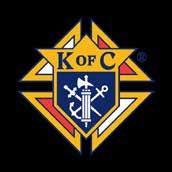
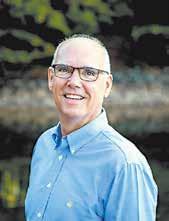


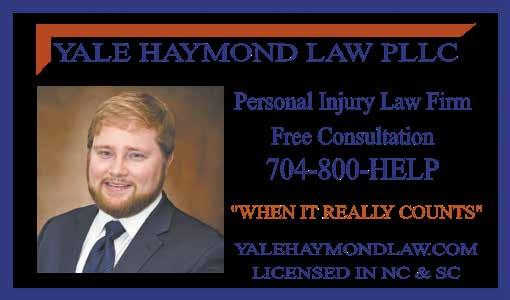
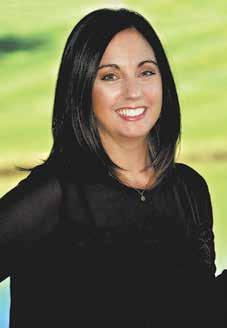



My heart goes out to the people in Western North Carolina. The devastation is unlike anything I’ve seen. I feel a deep emotional connection to the places that Helene has destroyed. Even the Flowering Bridge of Lake Lure I wrote about in June is gone. It was one of the most cherished trips I made this year. It prompts the age-old question: Why does God permit suffering? Theologians have wrestled with this question for centuries. The entire Book of Job is devoted to answering a similar question: Why do bad things happen to good people? Amid a tragedy, few answers truly satisfy.
When I minister to a person in great suffering, I’ve realized it does no good to list the reasons for suffering proposed throughout the ages and doesn’t help to offer tidbits of encouraging advice. I just show up. I let them know I care. I join in their cries of loss and groans of pain. It sometimes feels like they’re in a deep, dark hole. Instead of being the cheerleader at the top of the hole (“Come up into the light!”), I crawl into the hole, sit next to them, and sigh.
The Book of Job is filled with a lot of bad advice Job received from his friends, which prompted God to finally say, “Who is this who darkens counsel with words of ignorance?” (Job 38:2). I don’t want to be that person.
After pages of speculation as to why this was happening, and even after Job asks God to please explain, it’s not until Chapter 38 that Job receives an answer from God for his lament. It begins with the telling words, “Then the Lord answered Job out of the storm and said …” (38:1). It is in the storms of life that God sometimes speaks the loudest.
Instead of rationalizing divine justice, God beautifully catalogs for Job all the wonders of creation. When a person cries out “Why!” he or she is probably not going to get an answer. But it helps to take an inventory of what God has done to shore up the hope of what God will continue to do. God’s three-chapter response to Job could be summarized in three words, “I got this.”
I’ve heard the entirety of the Bible can be summed up in three simple phrases, sometimes called “The Mantra of God.” Here they are: I love you. I am with you. Trust me.
May you hear God speaking the mantra into your heart in whatever you are going through.
DEACON SCOTT GILFILLAN is a blogger, retreat master and spiritual director.

AScripture shows how
s the hurricane closed in, weather broadcasters offered a steady stream of expert advice on how to prepare. Now that the storm is past, and we see how much damage and loss are left in the storm’s wake, some might feel bewildered about what to do next.
How can we help others cope with the hard work that lies ahead?
How can we uplift, understand and encourage?
Three places in Scripture seem appropriate for reflection as we embrace those, however near or far, who have suffered greatly from this storm or any life-changing crisis.
LAMENTATIONS: RELEASE THE SORROW
The Book of Lamentations gives expression to a very human and necessary emotional response to the deep sorrow of loss. It shows us that crisis can appropriately (and faithfully) be met with open, expressed grief. Flowing from the anguish suffered when Jerusalem fell to Nebuchadnezzar’s army in 587 B.C., the work begins with the simple word: “how.” We might understand that expression today, asking, “How could this happen?” or simply saying, as we see what has happened, “How terrible.” And with this simple word, a flow of emotion-laced words might fall, like tears.
Yet, as much as it expresses bare and raw grief, the Book of Lamentations does not end there. It rises and falls and rises again in lament, but nestled within the verses, especially in Lamentations 3, it expresses hope in God’s mercy and ultimate saving hand. It is almost as if the flood of tears, the release of sorrow, enables those who mourn to find comfort and strength from abiding faith.
EXODUS: PRAISE, JOY AND
The second example from Scripture shows another response to surviving very serious crisis. In Exodus 14 and 15, Moses leads the Israelites out of Egypt, but they are not clear of danger. Pharaoh’s army pursues them mercilessly.
It must have been terrifying to think that this
powerful force was gaining ground, aiming to not only take the Israelites back, but probably exact heavy punishment on those who fled.
Yet God does not abandon the Israelites. In an act mightier than any pharaonic army could ever devise, God parts the waters of the Red Sea for the Israelites to pass safely to the other side, then drowns Pharaoh’s forces as they attempt to follow.
In the aftermath, Moses makes a sacrifice to God and leads the Israelites in praiseful song. His sister, Miriam, leads the Israelite women in song, too, thanking God in joyful worship.
Gratitude, praise, moments of joyful outburst: The Book of Exodus shows us how we might draw energy and hope out of a horrible ordeal.
The New Testament is also a place to find support in the aftermath of a crisis. In Acts, after Jesus’ crucifixion, the apostles and Jesus’ other followers could not have known what was going to happen next.
Persecution, imprisonment, more loss and death –any of these and other dangers were possible.
In Acts 1:4, Jesus tells His disciples not to leave Jerusalem, but to stay and wait for “the promise of the Father,” and they did.
Staying close, sharing their faith and breaking bread together, the cluster of Jesus’ followers received the gift of the Holy Spirit and were sent forth, witnessing to the good news.
The fellowship forged from crisis has been a blessing for centuries since.
Honest tears for what has happened, praise for light after the storm and gratitude for fellowship that helps us grow – these gifts from Scripture are support for today and in the days to come.
MAUREEN PRATT is founder and executive director of The Peace in the Storm Project. She wrote this while a columnist for Catholic News Service in October 2022, after Hurricane Ian battered the southeastern United States.

Natural disasters are nothing new on the planet. The fact that they are referred to as “natural” begs the question why we are so often caught asking ourselves “why?” The latest rampages of Mother Nature in North America – Storm Helene (closely followed by Storm Milton) – brought unexpected destruction because of the high ground where it dumped its record-breaking rainfall.
We don’t normally link hurricane damage with the Smoky Mountains. As I visited some of the hardest-hit areas of western North Carolina, the irony was on full display: a number of survivors with whom I spoke had recently moved here from Florida, hoping to avoid such tempests. No such luck. Communities built along streams over 100 years ago for the
‘The Catholic Church walks with the world. We walk in good times and in bad, in sunshine and in hurricane.’
mill power that the river could provide were ultimately destroyed by that very power on steroids.
Between 20 to 30 inches of rainfall in two days created extreme volumes of water, which raced down mountainsides into valleys, generating a force that could rival coastal storm surges. You don’t need to be an environmental scientist to understand it, but it was still unbelievable to see its results. The town of Swannanoa in particular left me speechless – and for those who know me, that is saying something.
NO COMPETITION IN THE RACE OF MISERY
Why read further? This is by no means “news,” and while many are still without power and water (another irony), the news of the day has moved on to other areas of the human experience that catch our fascination. I wish I could present some unique dynamic that qualifies our disaster as somehow different. And yet, there is no competition in the race of misery. There is no comparison between “my” tale of woe and yours.
Ultimately, each disaster is personal: The only thing that matters is that my disaster is “mine.” And until such a time as my house can be rebuilt and my town can get back to business and my church can worship again with electricity and functioning plumbing, my life is the one most in need and my fear is that people will
begin to forget what we have been through and move on without me and my family.
How does the Church walk with people in this challenging moment? To think that we can bring the same level of resources that federal, state and local government officials can is to misunderstand our mission. Certainly, we, especially through Catholic Charities, can address some of the incredible needs that are coming forward at this time – more about that later.
However, that is only part of our mission – and when overly emphasized, it can keep us from exploring the greater depths of grace that are present to us in moments such as these. What then does the Church bring to such a time of devastation, beyond the valid and wonderful attempts to address people’s material needs?
As Pope Francis has thrown such a powerful spotlight on synodality, here is a place to make it real. So often, especially in the USA, we drift toward action. As beneficial as that innate response may be, it is insufficient for the moment. Being with people, a step essential in synodality, is what is needed, and it is hard – really hard. I spent just a few days in those devastated communities, and I was exhausted.
Sure, I hauled supplies in my car and was able to make a donation, but that was nothing in comparison to the pain I felt when I met – and walked with – the people who have lost so much. I could feel my own heart desiring to head back to the city so that my life could “get back to normal.”
Was my visit enough? Probably not. But that is where we as a Church can commit to “being with” when none of us can do it alone.
The Catholic Church walks with the world. We walk in good times and in bad, in sunshine and in hurricane. We walk with. Certainly I would love for you to support the relief efforts, but I would also invite you to consider if you are ready to walk with those in need, or (even more difficult) to walk with those with whom you disagree –not for just a moment, but as a way of life.
As election time draws near, we are confronted with the juxtaposition of many people willingly making sacrifices for hurricane victims without even the slightest consideration of their political views, while we may disdain to even live on the same street as someone who has a yard sign displaying support of a candidate we can’t stomach.
Synodality calls us to walk with everyone, to listen to everyone, just as Jesus did. If we don’t, the hurricanes of turmoil will break our land and our spirit far more than the wind and rains of Helene, Milton, and whatever else broken Mother Nature has in store.
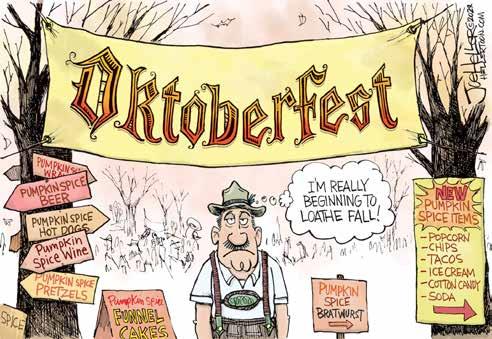
“Love is the beginning of a new life, destined to last not ‘as long as everything goes well’ but forever, accepting each other
and
living united as ‘one flesh.’ ”
Pope Francis
From online story: “Love is beautiful when lived generously, pope says at Angelus”

The Catholic News Herald reached the Facebook and Instagram feeds of more than 335,000 people in English and Spanish last month. The most talked about post? Coverage of relief efforts for Tropical Storm Helene in Western North Carolina. Join the conversation: www.facebook.com/CatholicNewsHerald.
On YouTube over the past 30 days, videos produced by the Catholic News Herald have been viewed more than 13,000 times.
Over the past 30 days, 49,500 visitors to www.catholicnewsherald.com have viewed a total of 83,000 pages. The top trending headlines are:




The Catholic News Herald welcomes letters from readers. We ask that letters be originals of 250 words or fewer, pertain to recent newspaper content or Catholic issues,








and clean office, and yet keep up with all the parish needs. I’ve been meeting with everyone to talk about the programs that are going on like faith formation, O.C.I.A. and the parish councils. They want to tell me about the good work they’re doing and see how I can support them. It’s a great example of people coming together and keeping the life of the parish flourishing.
We also began planning for the big liturgies like the Holy Hour, Vespers and Mass celebrating the 10th anniversary of our new church, plus the parish picnic afterward. A lot of it has been being there for the daily worship of God as I start to get into some of the bigger administrative responsibilities.
CNH: How have your years as a parochial vicar helped prepare you to be a pastor?
Father Mlakar: Gaining better familiarity with what I would call the human experience, especially meeting with people and ministering to them in their needs. That’s helped with the normal pastoral experience, being familiar with the sacraments.
Drawing on my experience as a parochial vicar, I was able to return to some of those things and build off routines and schedules.
CNH: What is your favorite part of being a priest?
Father Mlakar: Definitely visiting the sick and anointing the sick, because I was ordained during COVID, and when I was at St. Vincent de Paul, we were the go-to parish for one of the big hospitals in that area. At a time when many people weren’t able to get into the hospital to visit the sick, they actually were calling us pretty frequently to visit and administer the sacraments. That is a sacrament that’s always touching to administer, especially to those who are receiving it for the last time.
CNH: Can you share a part of your own spiritual life?
Father Mlakar: The everyday pastoral tasks up here involve a lot of driving. St. Frances of Rome Mission is about a 40-minute drive from St. Francis Parish in Jefferson. I’ve been on the road a lot, so I’ve had to learn how to use that time for reflection and renewal for prayer instead of listening to a podcast or something like that.
CNH: What are you reading?
Father Mlakar: During these first months as a pastor, I’ve developed a devotion to St. Gregory the Great. He has a book on pastoral care, so he has been my favorite saint recently. He was a pope in the early Middle Ages, and he wrote the go-to book for pastors even way back then, and it’s been used throughout Church history, so that’s been my spiritual reading, and he’s been my saint that I’ve been praying to and thinking about a lot.
FROM PAGE 6
CNH: How have your parishioners welcomed you?
Father Carlson: I’ve been overwhelmed with how many people have reached out from St. Dorothy’s to offer assistance, help or care or milk – really anything that’s needed. I’ve never had so many people offer to move boxes and just help move in. Also, I don’t think I’ve been hugged as many times as I have in these past few weeks!
CNH: What are you looking forward to most as pastor?
Father Carlson: Being a preacher and a teacher of the faith and really embracing and growing into those roles is really exciting.
CNH: How have your years as a parochial
vicar helped prepare you to be a pastor?
Father Carlson: The most important thing I learned is to always pray. I’ve started something where even before I go to somebody’s home or certainly if I’m going to administer anointing of the sick to someone, I’ll pray the whole time or at least pray a little bit before I go. It’s something I picked up from almost every priest that I’ve spent time with whether for summer assignment or as parochial vicar. That’ll be my lasting memory of our former Bishop Jugis. Whenever I met with him one-on-one for something, he would always in the meeting prayerfully discern something. I would experience that in a very powerful way, and it’s something that I don’t ever want to lose sight of – what the goal really is: the salvation of souls.
CNH: What are you reading?
Father Carlson: Right now, I’m reading “The Brothers Karamazov,” and for my spiritual
assignments that help you as a pastor?
reading “The Mystical Evolution” by a Spanish Dominican friar. It sounds kind of fancy but, really, it’s just about how do we really put on Christ to the degree that it’s really Him living through us? I want to slowly go through it this year and try to really absorb and implement what’s in those pages.
CNH: How has the example of other priests helped you become the pastor you are today?
Father Carlson: I’ve been involved with many great priests where they really do sacrifice for people, and they care about them. As a parent oftentimes, you’re thinking about your children. Well, priests think about their parishioners, the things going on in their lives, and that’s not something I’ve created but that is something I’ve received from the priests I’ve been around. In my experience, it’s been a great group of men who really do just want to bring Christ to their people.
a católicos y no católicos por igual. Todo el tiempo, están celebrando misa para ayudar a las personas a restaurar el ritmo de su vida de fe y elevar oraciones por los perdidos y los desafíos que se avecinan. También se ha creado una página de solicitudes de oración en el sitio web de la diócesis.
Monseñor Patrick Winslow, quien ha dirigido gran parte de la respuesta de la
experience to help me learn. There’s a huge dynamic of trust-building in the beginning, where they need to grow their trust in me, and I grow to trust them. And I’m seeing that trust evolving. Also I’m learning that people in the parish want direction to see where the parish is going, where we should be putting our energy and time to be good stewards of the gifts God has given us. I’m really excited to get people involved in many things – building up youth ministry, building up the family. I’m being asked for my vision on guiding the flock and that is definitely a new experience because when I was a parochial vicar, I would depend on the guidance of my pastor – and now people are looking to me for that guidance.
CNH: What skills did you gain in your earlier
Father Gamez: Being visible. As a parochial vicar, I was visible in a lot of places where the pastor couldn’t be and I know people appreciated that, and I saw the fruits of that visibility. I want to incorporate that into my work as pastor and be present for people who need me.
CNH: What are you looking forward to as you grow into your role as pastor?
Father Gamez: I want to be able to live out Catholic culture together here as a parish through festivals, celebrations and all the things that make the seasons so vibrant and a lot more meaningful. I’m looking forward to celebrating Christmas and Lent and all the beautiful seasons with my parishioners.
CNH: Is there a certain part of your ministry as priest or pastor that is special to you?
Father Gamez: Giving the sacraments to the people, seeing the beginning stages of people’s journey with Christ and accompanying them to a new role of growth
parishioners who have been constructive in their feedback, I have been open to learning from both my successes and mistakes.
CNH: What challenges have you faced?
in the Lord. As a pastor, I will have a little more stability, because as a vicar I was transferred every few years. Now, as a pastor, I’m looking forward to seeing people through their lives with Christ – experiences like celebrating a wedding for someone I also knew when they were being confirmed.
CNH: Do you have a devotion to a particular saint that helps you with your ministry?
Father Gamez: My two saintly friends are St. John Paul II and St. Teresa of Calcutta, also known as Mother Teresa. As a millennial, I grew up under the papacy of John Paul II, and his love of the Eucharist, missionary spirit and love for working with young people made me fall in love with the Church. I hope to be as zealous and inspiring as he was. I also love St. Teresa’s tenderness and ability to see Christ in people. She was able to feed the spiritual poverty in other people’s lives, and that really resonated with me. That’s something I hope to do as a pastor.
and with wonderful people here to give me all the helping hands I need.
CNH: Do you have a devotion to a particular saint that helps you with your ministry?
everywhere and truly seek God with a sincere heart, irrespective of their race, background and social class. I have also created time within my weekly schedule for pastoral care for the sick in their homes and hospitals, providing members of my parish family with significant support in the Eucharist. I soon came to learn that ministry often requires adaptability – being prepared to adjust to plans and respond to unexpected challenges.
My role has required dedication, compassion and a commitment to serving Catholics and others within my parish geographical territory, Christians and non-Christians alike. Thanks to some of my
diócesis ante la tormenta, ha consultado con líderes de la Iglesia en Luisiana que vivieron el Huracán Katrina. En una carta a los sacerdotes, compartió noticias preocupantes de que la recuperación emocional de las personas tras la tormenta probablemente tomará un año. Los sobrevivientes de Katrina, la tormenta más catastrófica registrada en EE.UU., describieron tres fases de recuperación después de la tormenta como “Responder, Reabrir, Recuperar”, enfocándose primero en las necesidades inmediatas, luego en las necesidades a corto y largo plazo.
Father Ameh: Becoming a pastor has its own challenges. The first challenge that confronted me was trying to fit into the shoes of the previous pastor, who had worked passionately for and with the people for many years. I understand that my personality and style of shepherding may differ from his. Secondly, I am tasked with the responsibility of forming a parish council that can oversee the life and administration of the parish. Thirdly, because of our small size, the parish has no administrative personnel, so I have to be the pastor, secretary and catechist, to mention but a few roles. Nevertheless, I am optimistic that things will gradually fall in place as I look into the future with hope
“Como sacerdotes y diáconos que hemos servido en estas regiones, hemos observado con asombro y tristeza las imágenes que ahora se comparten”, dijo Monseñor Winslow, vicario general y canciller de la diócesis que previamente sirvió en parroquias de montaña en Tryon y Sparta. “Hay varios desafíos pastorales que se avecinan… ya que los esfuerzos de ayuda continuarán por algún tiempo y el costo humano tomará aún más tiempo para abordar.”
Mientras visitaban parroquias en las áreas dañadas, Monseñor Winslow y el obispo enfatizaron la necesidad de
Father Ameh: I have developed a loving relationship with three saints who are very dear to my heart: Mary, Mother of God; St. Joseph; and St. John Paul II. Perhaps the reason for choosing the first two may be obvious, since both were guardians of Jesus – and my biological mother and father also go by these names. As a student under formation many years back in the seminary, I fell in love with St. John Paul II and his writings. His understanding of the priesthood and of personhood has greatly shaped who I have become today. He believed that the priesthood is a mystery, and that of service to God’s people, bringing the love and strength of Christ to them.
acompañamiento y la dependencia del Espíritu Santo. “Sepan que el resto del mundo está muy con ustedes”, dijo el obispo Martin a la congregación en la misa en Waynesville el 6 de octubre. “Hay personas en toda nuestra diócesis, en todo nuestro país y en todo el mundo que se están acercando ahora para hacerles saber que no están solos.” La devastación causada por Helene “puede parecer abrumadora”, dijo, sin embargo, “nunca está más allá del alcance del poder del Espíritu Santo para transformarla en algo mayor.”